Small Business and Entrepreneurship Research Analysis
VerifiedAdded on 2020/09/08
|20
|6034
|104
AI Summary
The given assignment details provide a summary of small business and entrepreneurship research. It includes a list of references from various academic sources, including journals and books. The references cover topics such as social entrepreneurship, family involvement in businesses, job creation, innovation, and international entrepreneurship. Additionally, the assignment mentions online articles and websites providing information on successful CEOs and businesses. A suitable title for the assignment is 'Small Business and Entrepreneurship Research Analysis'. This analysis can be used by students to understand the various aspects of small business and entrepreneurship.
Contribute Materials
Your contribution can guide someone’s learning journey. Share your
documents today.

ESBM
Secure Best Marks with AI Grader
Need help grading? Try our AI Grader for instant feedback on your assignments.

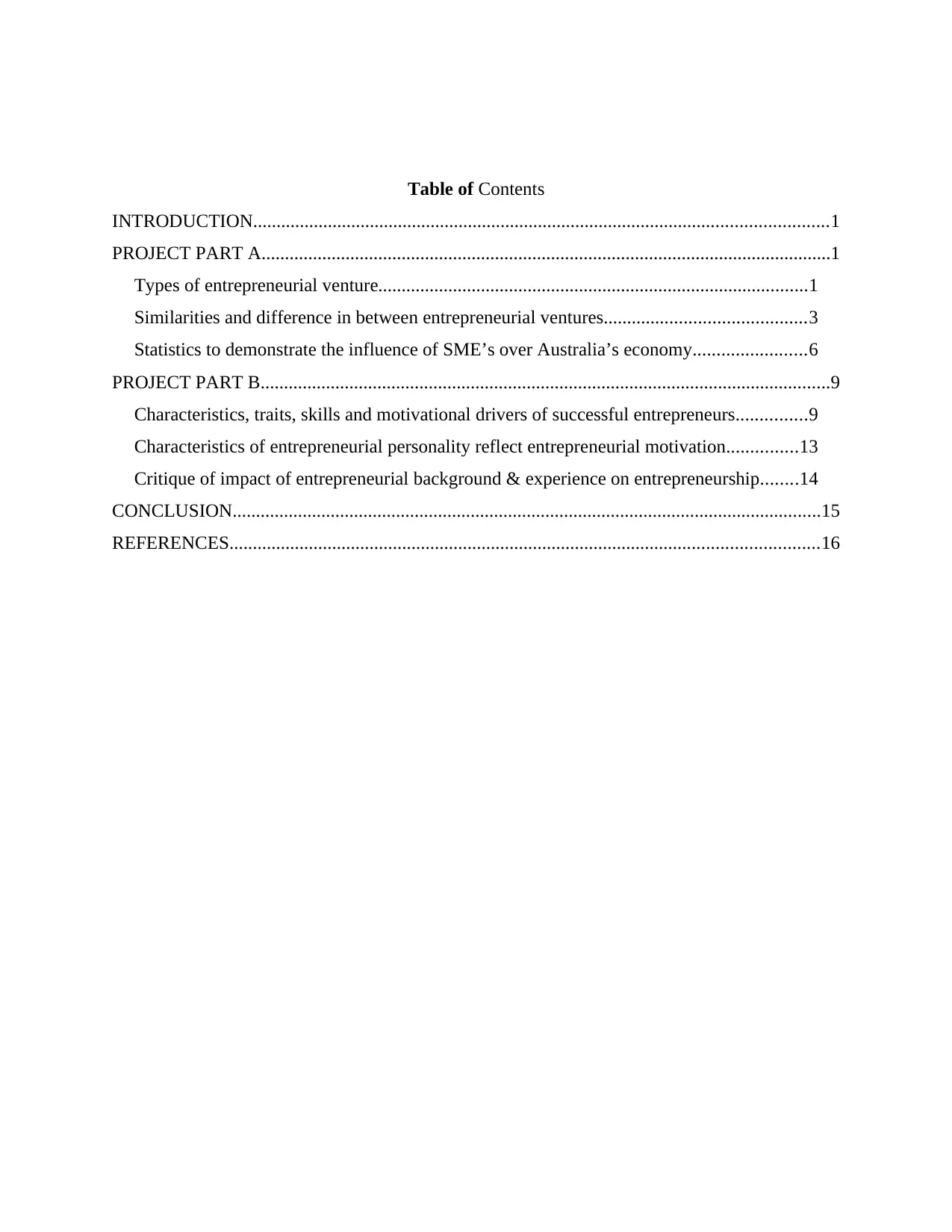
Table of Contents
INTRODUCTION...........................................................................................................................1
PROJECT PART A..........................................................................................................................1
Types of entrepreneurial venture............................................................................................1
Similarities and difference in between entrepreneurial ventures...........................................3
Statistics to demonstrate the influence of SME’s over Australia’s economy........................6
PROJECT PART B..........................................................................................................................9
Characteristics, traits, skills and motivational drivers of successful entrepreneurs...............9
Characteristics of entrepreneurial personality reflect entrepreneurial motivation...............13
Critique of impact of entrepreneurial background & experience on entrepreneurship........14
CONCLUSION..............................................................................................................................15
REFERENCES..............................................................................................................................16
INTRODUCTION...........................................................................................................................1
PROJECT PART A..........................................................................................................................1
Types of entrepreneurial venture............................................................................................1
Similarities and difference in between entrepreneurial ventures...........................................3
Statistics to demonstrate the influence of SME’s over Australia’s economy........................6
PROJECT PART B..........................................................................................................................9
Characteristics, traits, skills and motivational drivers of successful entrepreneurs...............9
Characteristics of entrepreneurial personality reflect entrepreneurial motivation...............13
Critique of impact of entrepreneurial background & experience on entrepreneurship........14
CONCLUSION..............................................................................................................................15
REFERENCES..............................................................................................................................16
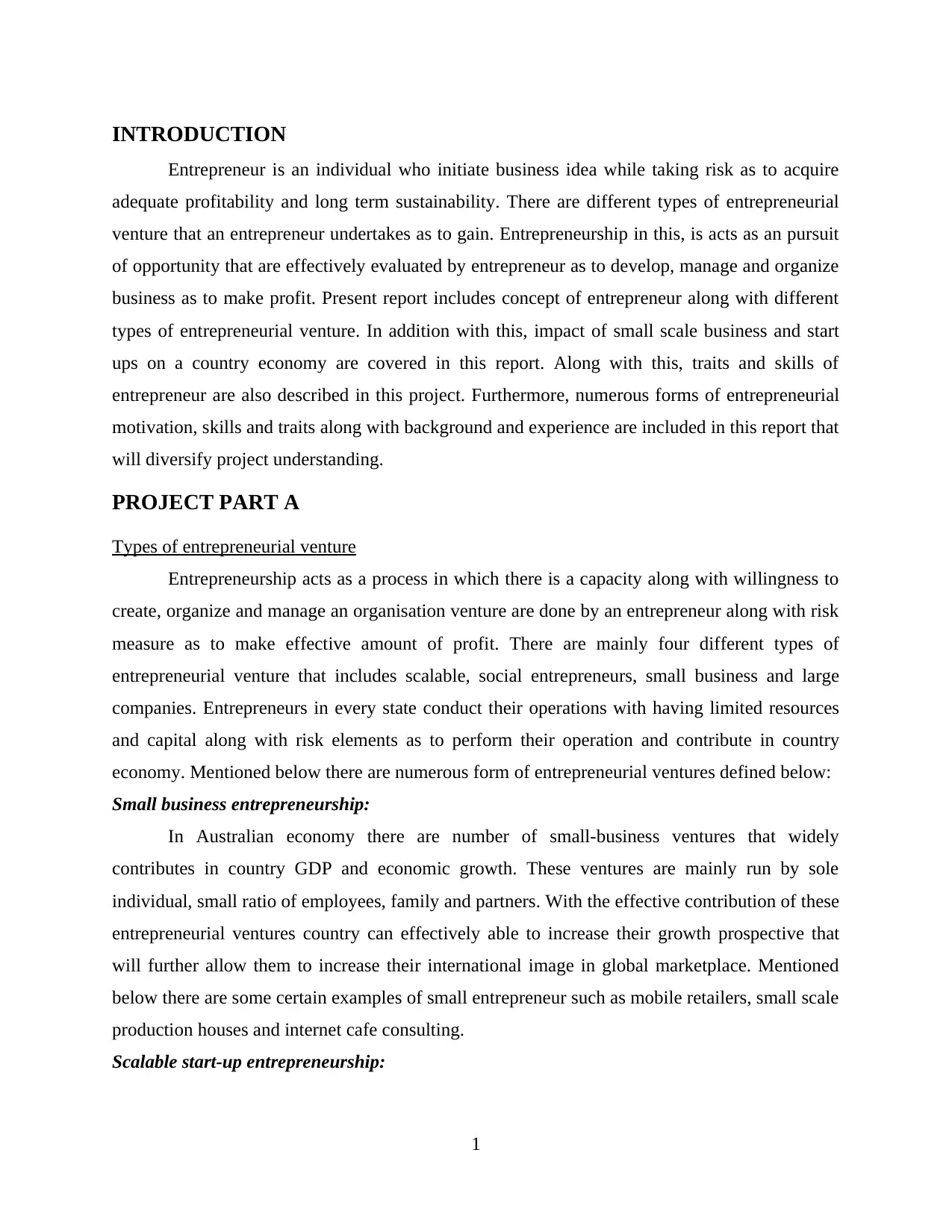
INTRODUCTION
Entrepreneur is an individual who initiate business idea while taking risk as to acquire
adequate profitability and long term sustainability. There are different types of entrepreneurial
venture that an entrepreneur undertakes as to gain. Entrepreneurship in this, is acts as an pursuit
of opportunity that are effectively evaluated by entrepreneur as to develop, manage and organize
business as to make profit. Present report includes concept of entrepreneur along with different
types of entrepreneurial venture. In addition with this, impact of small scale business and start
ups on a country economy are covered in this report. Along with this, traits and skills of
entrepreneur are also described in this project. Furthermore, numerous forms of entrepreneurial
motivation, skills and traits along with background and experience are included in this report that
will diversify project understanding.
PROJECT PART A
Types of entrepreneurial venture
Entrepreneurship acts as a process in which there is a capacity along with willingness to
create, organize and manage an organisation venture are done by an entrepreneur along with risk
measure as to make effective amount of profit. There are mainly four different types of
entrepreneurial venture that includes scalable, social entrepreneurs, small business and large
companies. Entrepreneurs in every state conduct their operations with having limited resources
and capital along with risk elements as to perform their operation and contribute in country
economy. Mentioned below there are numerous form of entrepreneurial ventures defined below:
Small business entrepreneurship:
In Australian economy there are number of small-business ventures that widely
contributes in country GDP and economic growth. These ventures are mainly run by sole
individual, small ratio of employees, family and partners. With the effective contribution of these
entrepreneurial ventures country can effectively able to increase their growth prospective that
will further allow them to increase their international image in global marketplace. Mentioned
below there are some certain examples of small entrepreneur such as mobile retailers, small scale
production houses and internet cafe consulting.
Scalable start-up entrepreneurship:
1
Entrepreneur is an individual who initiate business idea while taking risk as to acquire
adequate profitability and long term sustainability. There are different types of entrepreneurial
venture that an entrepreneur undertakes as to gain. Entrepreneurship in this, is acts as an pursuit
of opportunity that are effectively evaluated by entrepreneur as to develop, manage and organize
business as to make profit. Present report includes concept of entrepreneur along with different
types of entrepreneurial venture. In addition with this, impact of small scale business and start
ups on a country economy are covered in this report. Along with this, traits and skills of
entrepreneur are also described in this project. Furthermore, numerous forms of entrepreneurial
motivation, skills and traits along with background and experience are included in this report that
will diversify project understanding.
PROJECT PART A
Types of entrepreneurial venture
Entrepreneurship acts as a process in which there is a capacity along with willingness to
create, organize and manage an organisation venture are done by an entrepreneur along with risk
measure as to make effective amount of profit. There are mainly four different types of
entrepreneurial venture that includes scalable, social entrepreneurs, small business and large
companies. Entrepreneurs in every state conduct their operations with having limited resources
and capital along with risk elements as to perform their operation and contribute in country
economy. Mentioned below there are numerous form of entrepreneurial ventures defined below:
Small business entrepreneurship:
In Australian economy there are number of small-business ventures that widely
contributes in country GDP and economic growth. These ventures are mainly run by sole
individual, small ratio of employees, family and partners. With the effective contribution of these
entrepreneurial ventures country can effectively able to increase their growth prospective that
will further allow them to increase their international image in global marketplace. Mentioned
below there are some certain examples of small entrepreneur such as mobile retailers, small scale
production houses and internet cafe consulting.
Scalable start-up entrepreneurship:
1
Secure Best Marks with AI Grader
Need help grading? Try our AI Grader for instant feedback on your assignments.
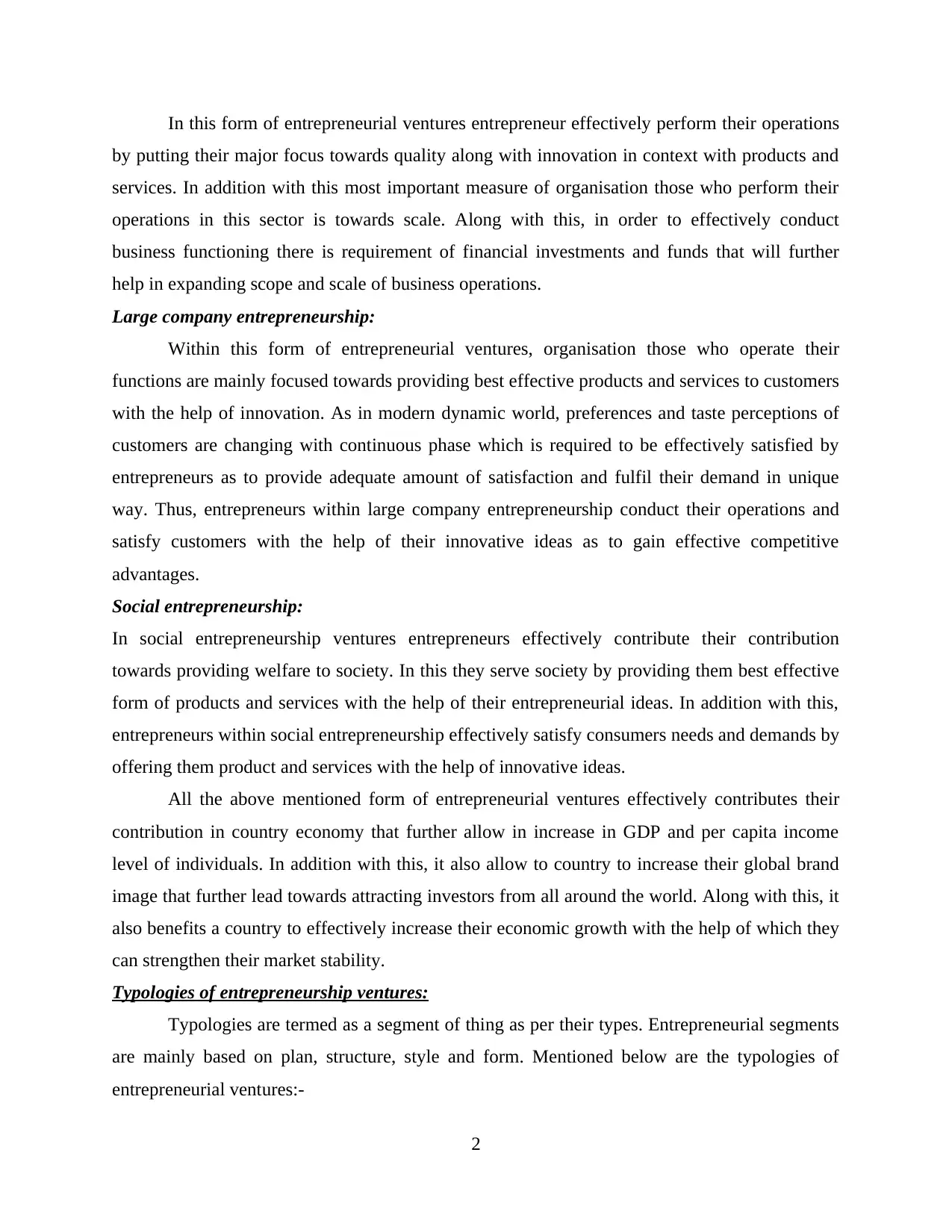
In this form of entrepreneurial ventures entrepreneur effectively perform their operations
by putting their major focus towards quality along with innovation in context with products and
services. In addition with this most important measure of organisation those who perform their
operations in this sector is towards scale. Along with this, in order to effectively conduct
business functioning there is requirement of financial investments and funds that will further
help in expanding scope and scale of business operations.
Large company entrepreneurship:
Within this form of entrepreneurial ventures, organisation those who operate their
functions are mainly focused towards providing best effective products and services to customers
with the help of innovation. As in modern dynamic world, preferences and taste perceptions of
customers are changing with continuous phase which is required to be effectively satisfied by
entrepreneurs as to provide adequate amount of satisfaction and fulfil their demand in unique
way. Thus, entrepreneurs within large company entrepreneurship conduct their operations and
satisfy customers with the help of their innovative ideas as to gain effective competitive
advantages.
Social entrepreneurship:
In social entrepreneurship ventures entrepreneurs effectively contribute their contribution
towards providing welfare to society. In this they serve society by providing them best effective
form of products and services with the help of their entrepreneurial ideas. In addition with this,
entrepreneurs within social entrepreneurship effectively satisfy consumers needs and demands by
offering them product and services with the help of innovative ideas.
All the above mentioned form of entrepreneurial ventures effectively contributes their
contribution in country economy that further allow in increase in GDP and per capita income
level of individuals. In addition with this, it also allow to country to increase their global brand
image that further lead towards attracting investors from all around the world. Along with this, it
also benefits a country to effectively increase their economic growth with the help of which they
can strengthen their market stability.
Typologies of entrepreneurship ventures:
Typologies are termed as a segment of thing as per their types. Entrepreneurial segments
are mainly based on plan, structure, style and form. Mentioned below are the typologies of
entrepreneurial ventures:-
2
by putting their major focus towards quality along with innovation in context with products and
services. In addition with this most important measure of organisation those who perform their
operations in this sector is towards scale. Along with this, in order to effectively conduct
business functioning there is requirement of financial investments and funds that will further
help in expanding scope and scale of business operations.
Large company entrepreneurship:
Within this form of entrepreneurial ventures, organisation those who operate their
functions are mainly focused towards providing best effective products and services to customers
with the help of innovation. As in modern dynamic world, preferences and taste perceptions of
customers are changing with continuous phase which is required to be effectively satisfied by
entrepreneurs as to provide adequate amount of satisfaction and fulfil their demand in unique
way. Thus, entrepreneurs within large company entrepreneurship conduct their operations and
satisfy customers with the help of their innovative ideas as to gain effective competitive
advantages.
Social entrepreneurship:
In social entrepreneurship ventures entrepreneurs effectively contribute their contribution
towards providing welfare to society. In this they serve society by providing them best effective
form of products and services with the help of their entrepreneurial ideas. In addition with this,
entrepreneurs within social entrepreneurship effectively satisfy consumers needs and demands by
offering them product and services with the help of innovative ideas.
All the above mentioned form of entrepreneurial ventures effectively contributes their
contribution in country economy that further allow in increase in GDP and per capita income
level of individuals. In addition with this, it also allow to country to increase their global brand
image that further lead towards attracting investors from all around the world. Along with this, it
also benefits a country to effectively increase their economic growth with the help of which they
can strengthen their market stability.
Typologies of entrepreneurship ventures:
Typologies are termed as a segment of thing as per their types. Entrepreneurial segments
are mainly based on plan, structure, style and form. Mentioned below are the typologies of
entrepreneurial ventures:-
2
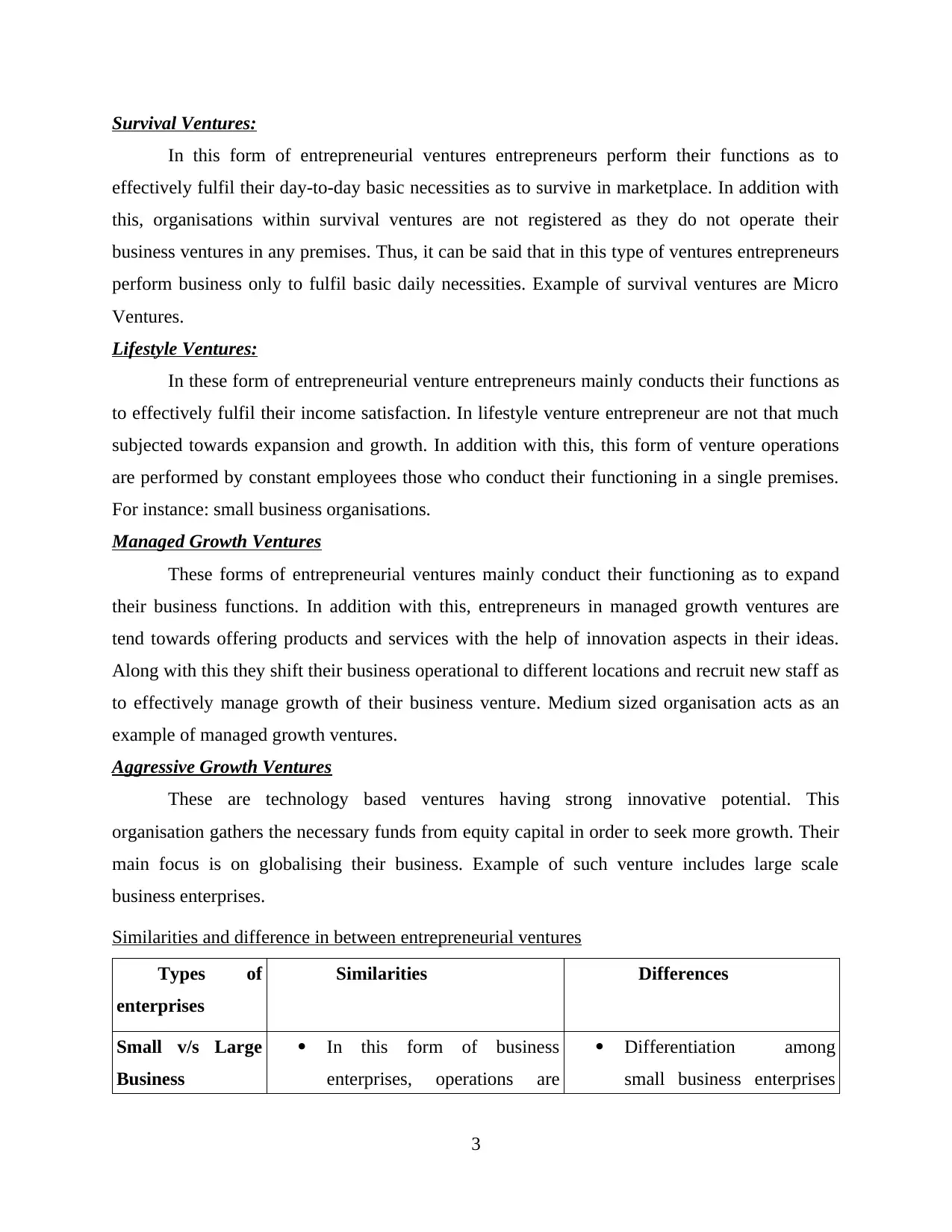
Survival Ventures:
In this form of entrepreneurial ventures entrepreneurs perform their functions as to
effectively fulfil their day-to-day basic necessities as to survive in marketplace. In addition with
this, organisations within survival ventures are not registered as they do not operate their
business ventures in any premises. Thus, it can be said that in this type of ventures entrepreneurs
perform business only to fulfil basic daily necessities. Example of survival ventures are Micro
Ventures.
Lifestyle Ventures:
In these form of entrepreneurial venture entrepreneurs mainly conducts their functions as
to effectively fulfil their income satisfaction. In lifestyle venture entrepreneur are not that much
subjected towards expansion and growth. In addition with this, this form of venture operations
are performed by constant employees those who conduct their functioning in a single premises.
For instance: small business organisations.
Managed Growth Ventures
These forms of entrepreneurial ventures mainly conduct their functioning as to expand
their business functions. In addition with this, entrepreneurs in managed growth ventures are
tend towards offering products and services with the help of innovation aspects in their ideas.
Along with this they shift their business operational to different locations and recruit new staff as
to effectively manage growth of their business venture. Medium sized organisation acts as an
example of managed growth ventures.
Aggressive Growth Ventures
These are technology based ventures having strong innovative potential. This
organisation gathers the necessary funds from equity capital in order to seek more growth. Their
main focus is on globalising their business. Example of such venture includes large scale
business enterprises.
Similarities and difference in between entrepreneurial ventures
Types of
enterprises
Similarities Differences
Small v/s Large
Business
In this form of business
enterprises, operations are
Differentiation among
small business enterprises
3
In this form of entrepreneurial ventures entrepreneurs perform their functions as to
effectively fulfil their day-to-day basic necessities as to survive in marketplace. In addition with
this, organisations within survival ventures are not registered as they do not operate their
business ventures in any premises. Thus, it can be said that in this type of ventures entrepreneurs
perform business only to fulfil basic daily necessities. Example of survival ventures are Micro
Ventures.
Lifestyle Ventures:
In these form of entrepreneurial venture entrepreneurs mainly conducts their functions as
to effectively fulfil their income satisfaction. In lifestyle venture entrepreneur are not that much
subjected towards expansion and growth. In addition with this, this form of venture operations
are performed by constant employees those who conduct their functioning in a single premises.
For instance: small business organisations.
Managed Growth Ventures
These forms of entrepreneurial ventures mainly conduct their functioning as to expand
their business functions. In addition with this, entrepreneurs in managed growth ventures are
tend towards offering products and services with the help of innovation aspects in their ideas.
Along with this they shift their business operational to different locations and recruit new staff as
to effectively manage growth of their business venture. Medium sized organisation acts as an
example of managed growth ventures.
Aggressive Growth Ventures
These are technology based ventures having strong innovative potential. This
organisation gathers the necessary funds from equity capital in order to seek more growth. Their
main focus is on globalising their business. Example of such venture includes large scale
business enterprises.
Similarities and difference in between entrepreneurial ventures
Types of
enterprises
Similarities Differences
Small v/s Large
Business
In this form of business
enterprises, operations are
Differentiation among
small business enterprises
3
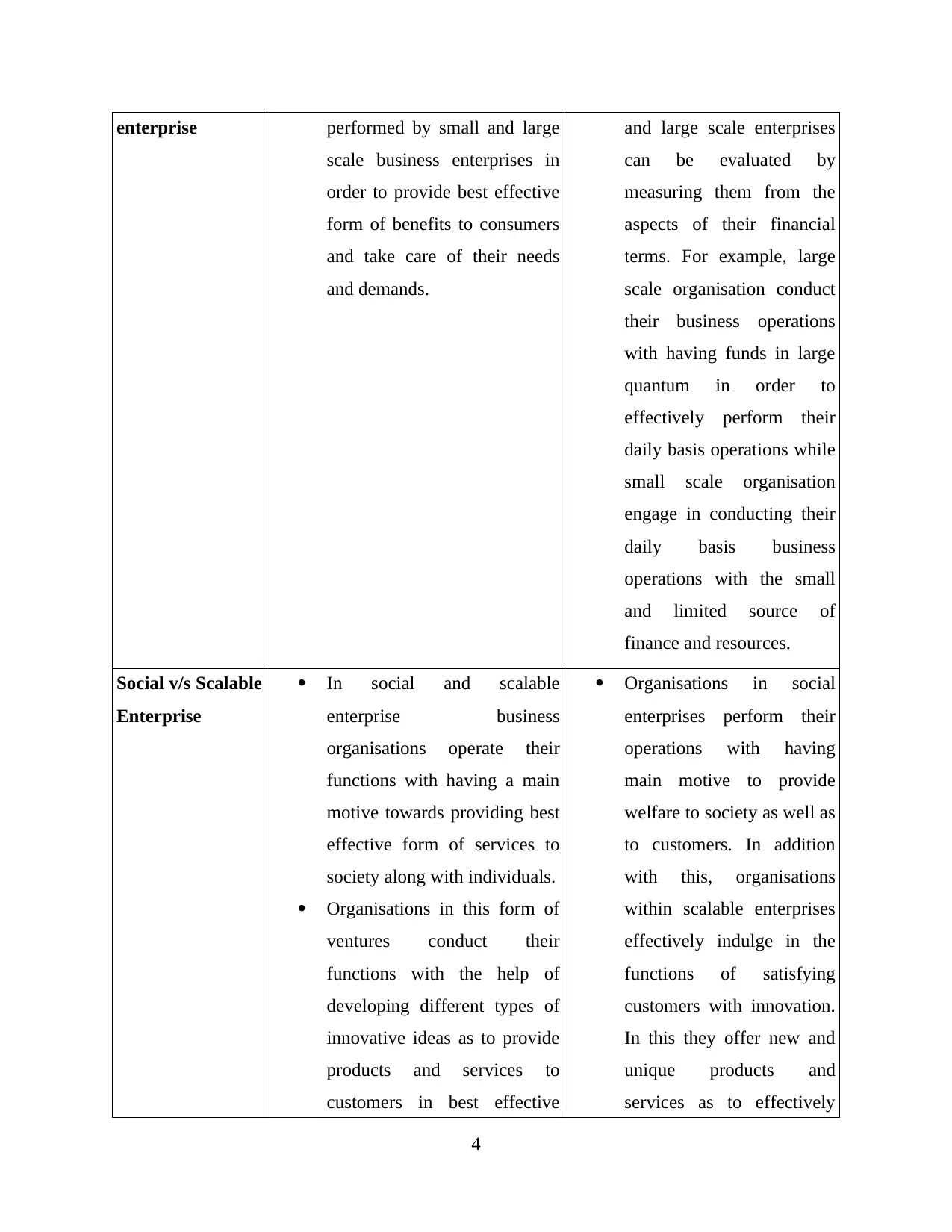
enterprise performed by small and large
scale business enterprises in
order to provide best effective
form of benefits to consumers
and take care of their needs
and demands.
and large scale enterprises
can be evaluated by
measuring them from the
aspects of their financial
terms. For example, large
scale organisation conduct
their business operations
with having funds in large
quantum in order to
effectively perform their
daily basis operations while
small scale organisation
engage in conducting their
daily basis business
operations with the small
and limited source of
finance and resources.
Social v/s Scalable
Enterprise
In social and scalable
enterprise business
organisations operate their
functions with having a main
motive towards providing best
effective form of services to
society along with individuals.
Organisations in this form of
ventures conduct their
functions with the help of
developing different types of
innovative ideas as to provide
products and services to
customers in best effective
Organisations in social
enterprises perform their
operations with having
main motive to provide
welfare to society as well as
to customers. In addition
with this, organisations
within scalable enterprises
effectively indulge in the
functions of satisfying
customers with innovation.
In this they offer new and
unique products and
services as to effectively
4
scale business enterprises in
order to provide best effective
form of benefits to consumers
and take care of their needs
and demands.
and large scale enterprises
can be evaluated by
measuring them from the
aspects of their financial
terms. For example, large
scale organisation conduct
their business operations
with having funds in large
quantum in order to
effectively perform their
daily basis operations while
small scale organisation
engage in conducting their
daily basis business
operations with the small
and limited source of
finance and resources.
Social v/s Scalable
Enterprise
In social and scalable
enterprise business
organisations operate their
functions with having a main
motive towards providing best
effective form of services to
society along with individuals.
Organisations in this form of
ventures conduct their
functions with the help of
developing different types of
innovative ideas as to provide
products and services to
customers in best effective
Organisations in social
enterprises perform their
operations with having
main motive to provide
welfare to society as well as
to customers. In addition
with this, organisations
within scalable enterprises
effectively indulge in the
functions of satisfying
customers with innovation.
In this they offer new and
unique products and
services as to effectively
4
Paraphrase This Document
Need a fresh take? Get an instant paraphrase of this document with our AI Paraphraser
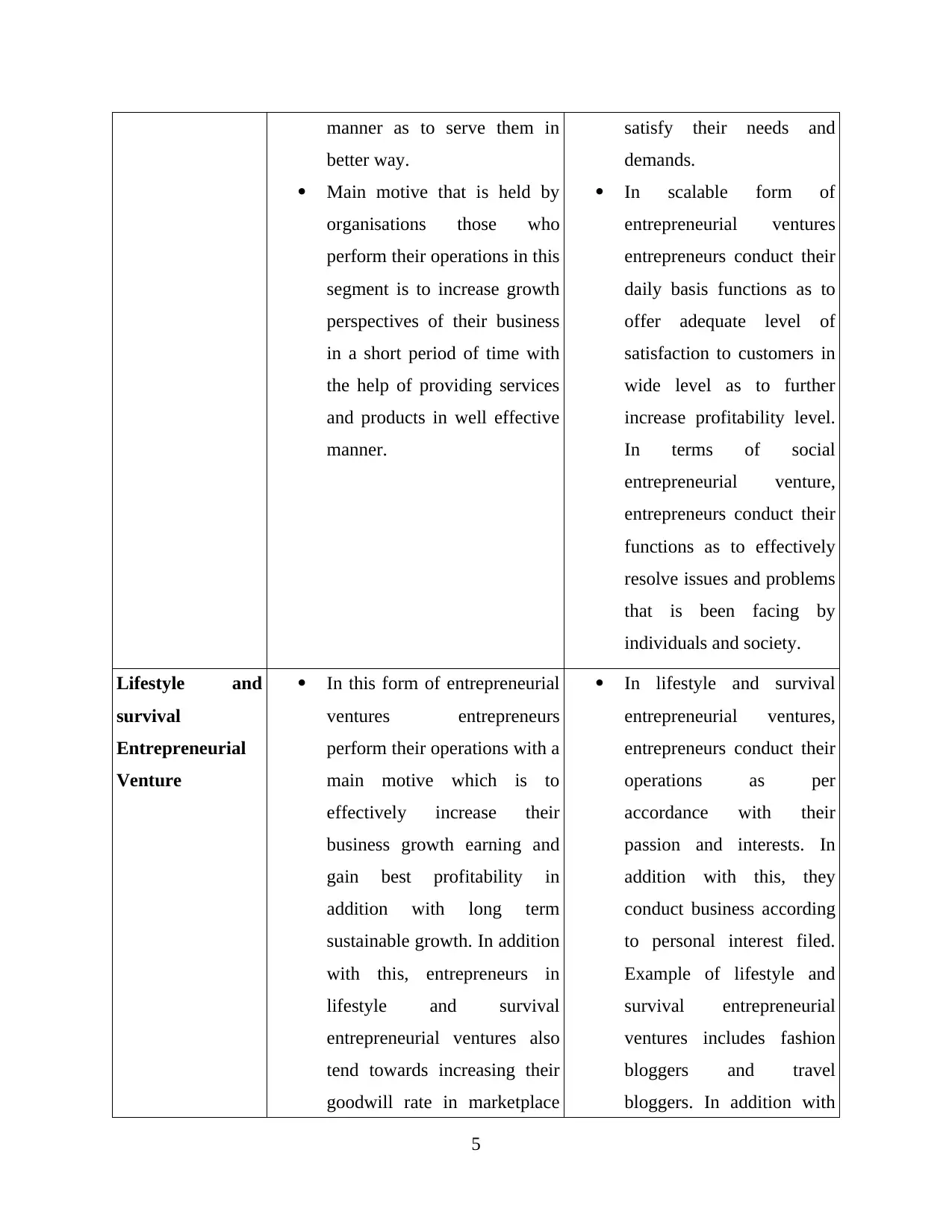
manner as to serve them in
better way.
Main motive that is held by
organisations those who
perform their operations in this
segment is to increase growth
perspectives of their business
in a short period of time with
the help of providing services
and products in well effective
manner.
satisfy their needs and
demands.
In scalable form of
entrepreneurial ventures
entrepreneurs conduct their
daily basis functions as to
offer adequate level of
satisfaction to customers in
wide level as to further
increase profitability level.
In terms of social
entrepreneurial venture,
entrepreneurs conduct their
functions as to effectively
resolve issues and problems
that is been facing by
individuals and society.
Lifestyle and
survival
Entrepreneurial
Venture
In this form of entrepreneurial
ventures entrepreneurs
perform their operations with a
main motive which is to
effectively increase their
business growth earning and
gain best profitability in
addition with long term
sustainable growth. In addition
with this, entrepreneurs in
lifestyle and survival
entrepreneurial ventures also
tend towards increasing their
goodwill rate in marketplace
In lifestyle and survival
entrepreneurial ventures,
entrepreneurs conduct their
operations as per
accordance with their
passion and interests. In
addition with this, they
conduct business according
to personal interest filed.
Example of lifestyle and
survival entrepreneurial
ventures includes fashion
bloggers and travel
bloggers. In addition with
5
better way.
Main motive that is held by
organisations those who
perform their operations in this
segment is to increase growth
perspectives of their business
in a short period of time with
the help of providing services
and products in well effective
manner.
satisfy their needs and
demands.
In scalable form of
entrepreneurial ventures
entrepreneurs conduct their
daily basis functions as to
offer adequate level of
satisfaction to customers in
wide level as to further
increase profitability level.
In terms of social
entrepreneurial venture,
entrepreneurs conduct their
functions as to effectively
resolve issues and problems
that is been facing by
individuals and society.
Lifestyle and
survival
Entrepreneurial
Venture
In this form of entrepreneurial
ventures entrepreneurs
perform their operations with a
main motive which is to
effectively increase their
business growth earning and
gain best profitability in
addition with long term
sustainable growth. In addition
with this, entrepreneurs in
lifestyle and survival
entrepreneurial ventures also
tend towards increasing their
goodwill rate in marketplace
In lifestyle and survival
entrepreneurial ventures,
entrepreneurs conduct their
operations as per
accordance with their
passion and interests. In
addition with this, they
conduct business according
to personal interest filed.
Example of lifestyle and
survival entrepreneurial
ventures includes fashion
bloggers and travel
bloggers. In addition with
5
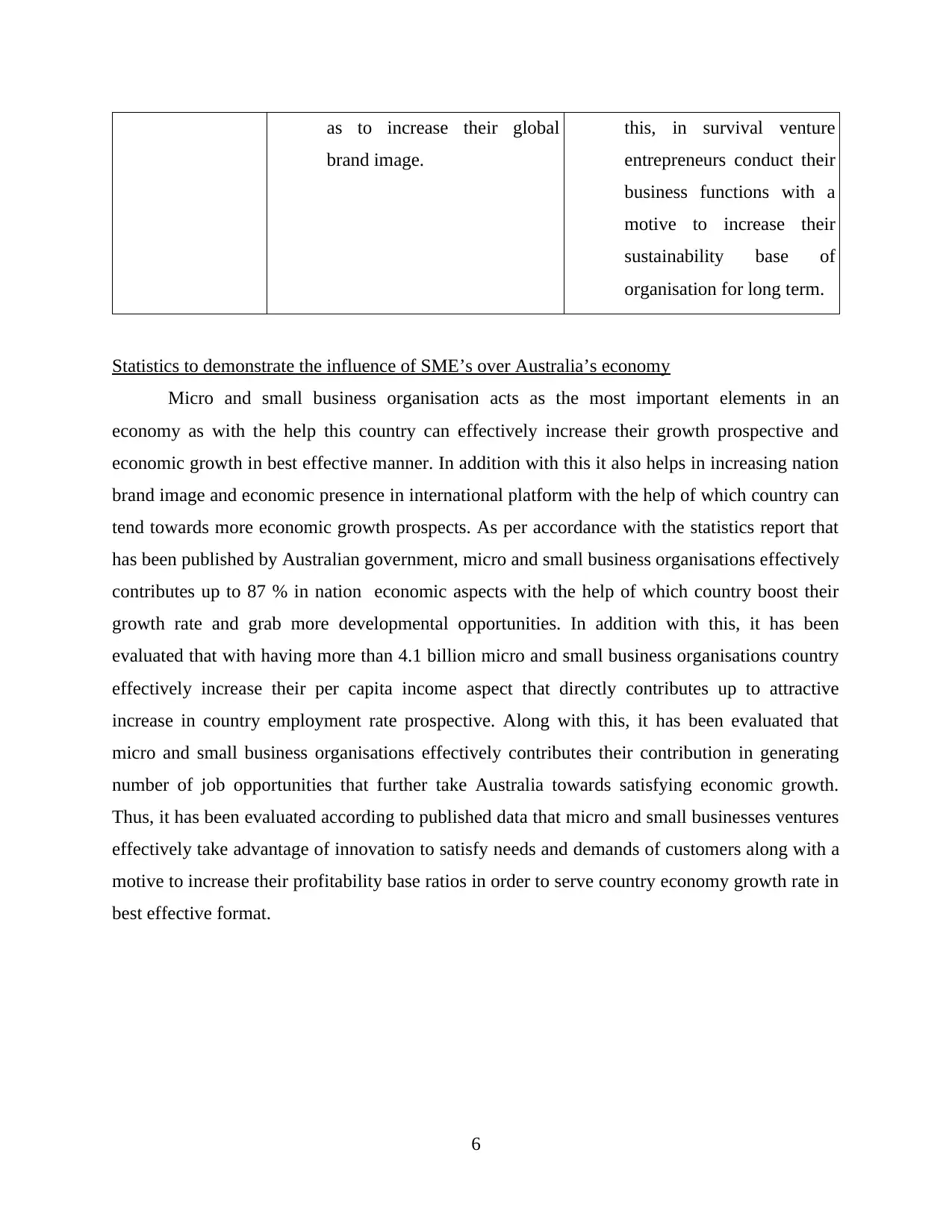
as to increase their global
brand image.
this, in survival venture
entrepreneurs conduct their
business functions with a
motive to increase their
sustainability base of
organisation for long term.
Statistics to demonstrate the influence of SME’s over Australia’s economy
Micro and small business organisation acts as the most important elements in an
economy as with the help this country can effectively increase their growth prospective and
economic growth in best effective manner. In addition with this it also helps in increasing nation
brand image and economic presence in international platform with the help of which country can
tend towards more economic growth prospects. As per accordance with the statistics report that
has been published by Australian government, micro and small business organisations effectively
contributes up to 87 % in nation economic aspects with the help of which country boost their
growth rate and grab more developmental opportunities. In addition with this, it has been
evaluated that with having more than 4.1 billion micro and small business organisations country
effectively increase their per capita income aspect that directly contributes up to attractive
increase in country employment rate prospective. Along with this, it has been evaluated that
micro and small business organisations effectively contributes their contribution in generating
number of job opportunities that further take Australia towards satisfying economic growth.
Thus, it has been evaluated according to published data that micro and small businesses ventures
effectively take advantage of innovation to satisfy needs and demands of customers along with a
motive to increase their profitability base ratios in order to serve country economy growth rate in
best effective format.
6
brand image.
this, in survival venture
entrepreneurs conduct their
business functions with a
motive to increase their
sustainability base of
organisation for long term.
Statistics to demonstrate the influence of SME’s over Australia’s economy
Micro and small business organisation acts as the most important elements in an
economy as with the help this country can effectively increase their growth prospective and
economic growth in best effective manner. In addition with this it also helps in increasing nation
brand image and economic presence in international platform with the help of which country can
tend towards more economic growth prospects. As per accordance with the statistics report that
has been published by Australian government, micro and small business organisations effectively
contributes up to 87 % in nation economic aspects with the help of which country boost their
growth rate and grab more developmental opportunities. In addition with this, it has been
evaluated that with having more than 4.1 billion micro and small business organisations country
effectively increase their per capita income aspect that directly contributes up to attractive
increase in country employment rate prospective. Along with this, it has been evaluated that
micro and small business organisations effectively contributes their contribution in generating
number of job opportunities that further take Australia towards satisfying economic growth.
Thus, it has been evaluated according to published data that micro and small businesses ventures
effectively take advantage of innovation to satisfy needs and demands of customers along with a
motive to increase their profitability base ratios in order to serve country economy growth rate in
best effective format.
6
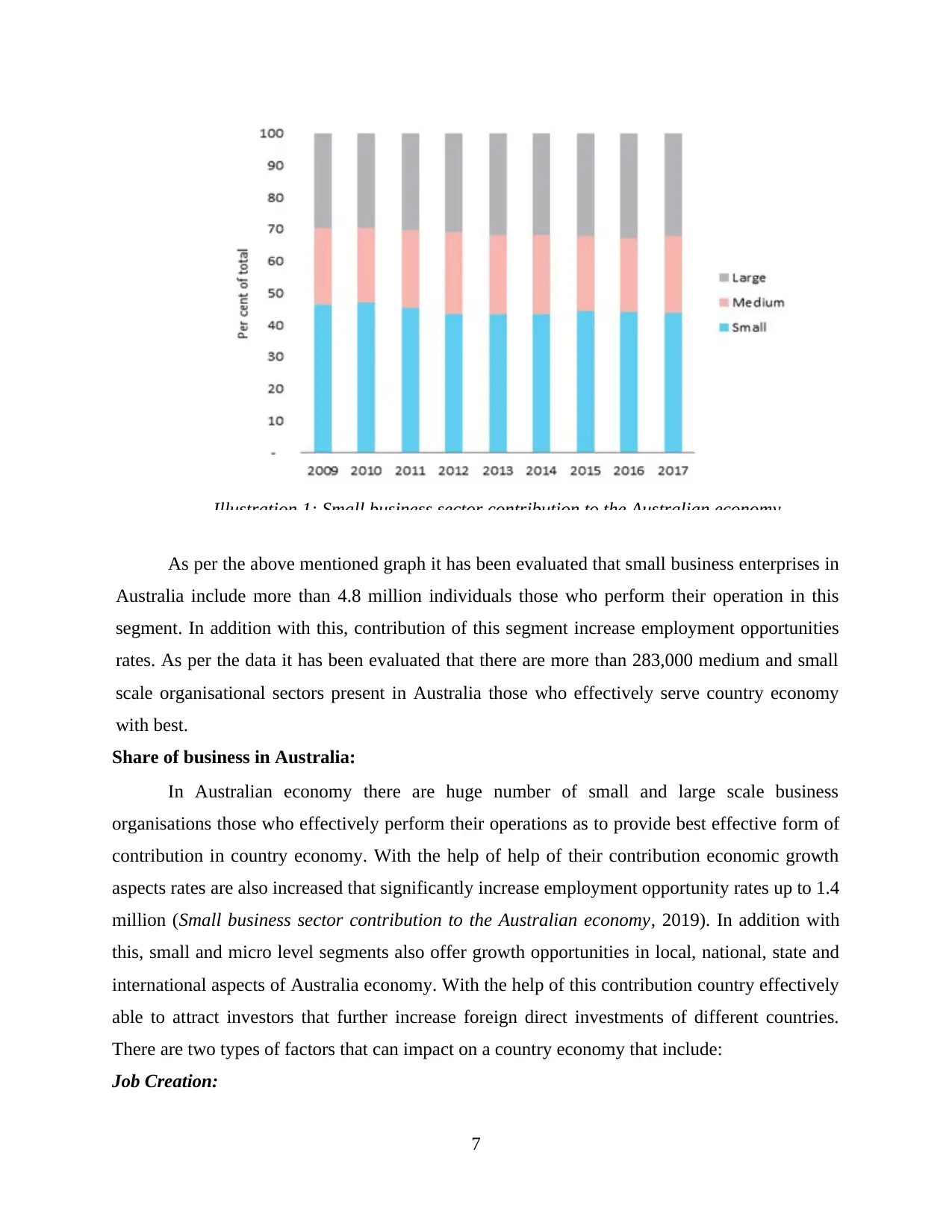
As per the above mentioned graph it has been evaluated that small business enterprises in
Australia include more than 4.8 million individuals those who perform their operation in this
segment. In addition with this, contribution of this segment increase employment opportunities
rates. As per the data it has been evaluated that there are more than 283,000 medium and small
scale organisational sectors present in Australia those who effectively serve country economy
with best.
Share of business in Australia:
In Australian economy there are huge number of small and large scale business
organisations those who effectively perform their operations as to provide best effective form of
contribution in country economy. With the help of help of their contribution economic growth
aspects rates are also increased that significantly increase employment opportunity rates up to 1.4
million (Small business sector contribution to the Australian economy, 2019). In addition with
this, small and micro level segments also offer growth opportunities in local, national, state and
international aspects of Australia economy. With the help of this contribution country effectively
able to attract investors that further increase foreign direct investments of different countries.
There are two types of factors that can impact on a country economy that include:
Job Creation:
7
Illustration 1: Small business sector contribution to the Australian economy
Australia include more than 4.8 million individuals those who perform their operation in this
segment. In addition with this, contribution of this segment increase employment opportunities
rates. As per the data it has been evaluated that there are more than 283,000 medium and small
scale organisational sectors present in Australia those who effectively serve country economy
with best.
Share of business in Australia:
In Australian economy there are huge number of small and large scale business
organisations those who effectively perform their operations as to provide best effective form of
contribution in country economy. With the help of help of their contribution economic growth
aspects rates are also increased that significantly increase employment opportunity rates up to 1.4
million (Small business sector contribution to the Australian economy, 2019). In addition with
this, small and micro level segments also offer growth opportunities in local, national, state and
international aspects of Australia economy. With the help of this contribution country effectively
able to attract investors that further increase foreign direct investments of different countries.
There are two types of factors that can impact on a country economy that include:
Job Creation:
7
Illustration 1: Small business sector contribution to the Australian economy
Secure Best Marks with AI Grader
Need help grading? Try our AI Grader for instant feedback on your assignments.
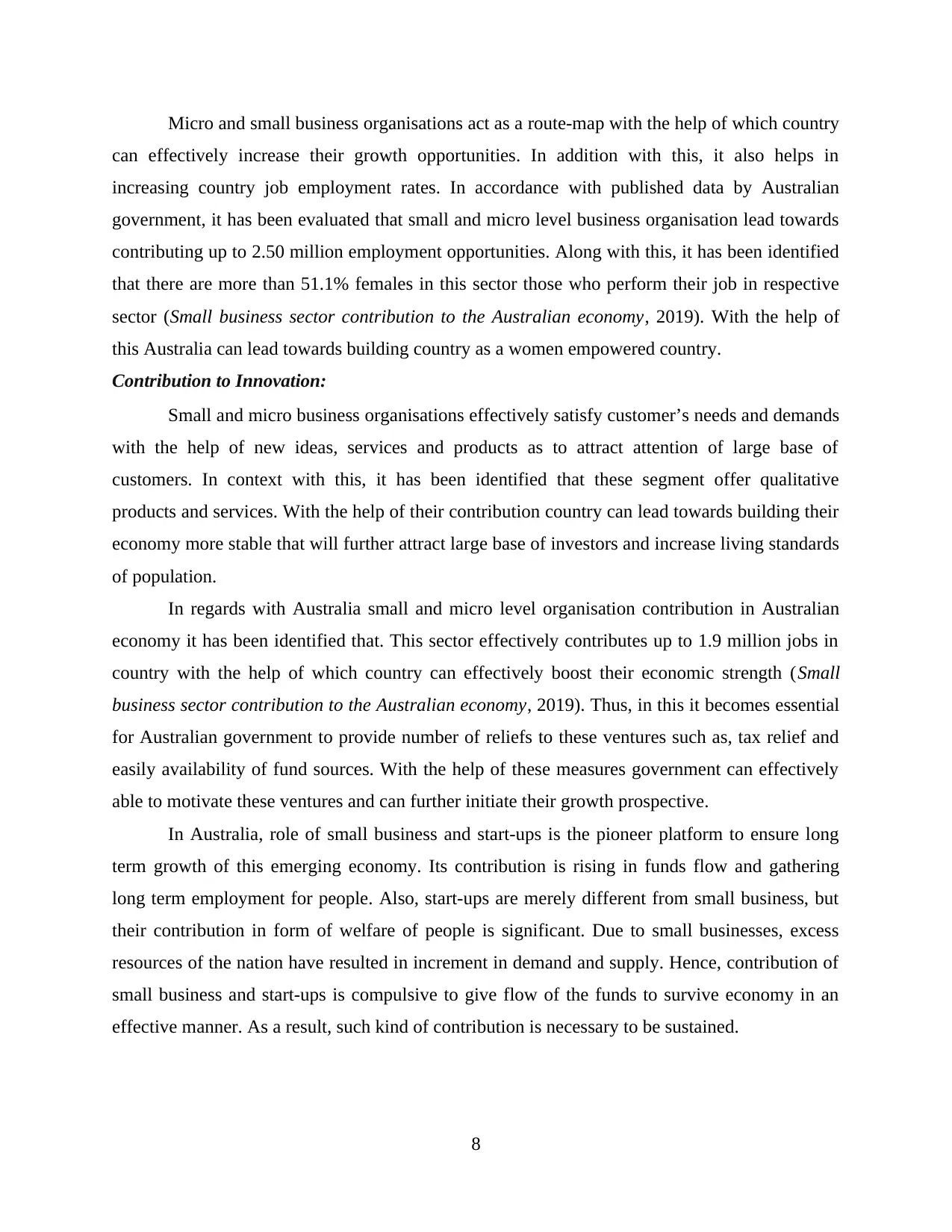
Micro and small business organisations act as a route-map with the help of which country
can effectively increase their growth opportunities. In addition with this, it also helps in
increasing country job employment rates. In accordance with published data by Australian
government, it has been evaluated that small and micro level business organisation lead towards
contributing up to 2.50 million employment opportunities. Along with this, it has been identified
that there are more than 51.1% females in this sector those who perform their job in respective
sector (Small business sector contribution to the Australian economy, 2019). With the help of
this Australia can lead towards building country as a women empowered country.
Contribution to Innovation:
Small and micro business organisations effectively satisfy customer’s needs and demands
with the help of new ideas, services and products as to attract attention of large base of
customers. In context with this, it has been identified that these segment offer qualitative
products and services. With the help of their contribution country can lead towards building their
economy more stable that will further attract large base of investors and increase living standards
of population.
In regards with Australia small and micro level organisation contribution in Australian
economy it has been identified that. This sector effectively contributes up to 1.9 million jobs in
country with the help of which country can effectively boost their economic strength (Small
business sector contribution to the Australian economy, 2019). Thus, in this it becomes essential
for Australian government to provide number of reliefs to these ventures such as, tax relief and
easily availability of fund sources. With the help of these measures government can effectively
able to motivate these ventures and can further initiate their growth prospective.
In Australia, role of small business and start-ups is the pioneer platform to ensure long
term growth of this emerging economy. Its contribution is rising in funds flow and gathering
long term employment for people. Also, start-ups are merely different from small business, but
their contribution in form of welfare of people is significant. Due to small businesses, excess
resources of the nation have resulted in increment in demand and supply. Hence, contribution of
small business and start-ups is compulsive to give flow of the funds to survive economy in an
effective manner. As a result, such kind of contribution is necessary to be sustained.
8
can effectively increase their growth opportunities. In addition with this, it also helps in
increasing country job employment rates. In accordance with published data by Australian
government, it has been evaluated that small and micro level business organisation lead towards
contributing up to 2.50 million employment opportunities. Along with this, it has been identified
that there are more than 51.1% females in this sector those who perform their job in respective
sector (Small business sector contribution to the Australian economy, 2019). With the help of
this Australia can lead towards building country as a women empowered country.
Contribution to Innovation:
Small and micro business organisations effectively satisfy customer’s needs and demands
with the help of new ideas, services and products as to attract attention of large base of
customers. In context with this, it has been identified that these segment offer qualitative
products and services. With the help of their contribution country can lead towards building their
economy more stable that will further attract large base of investors and increase living standards
of population.
In regards with Australia small and micro level organisation contribution in Australian
economy it has been identified that. This sector effectively contributes up to 1.9 million jobs in
country with the help of which country can effectively boost their economic strength (Small
business sector contribution to the Australian economy, 2019). Thus, in this it becomes essential
for Australian government to provide number of reliefs to these ventures such as, tax relief and
easily availability of fund sources. With the help of these measures government can effectively
able to motivate these ventures and can further initiate their growth prospective.
In Australia, role of small business and start-ups is the pioneer platform to ensure long
term growth of this emerging economy. Its contribution is rising in funds flow and gathering
long term employment for people. Also, start-ups are merely different from small business, but
their contribution in form of welfare of people is significant. Due to small businesses, excess
resources of the nation have resulted in increment in demand and supply. Hence, contribution of
small business and start-ups is compulsive to give flow of the funds to survive economy in an
effective manner. As a result, such kind of contribution is necessary to be sustained.
8
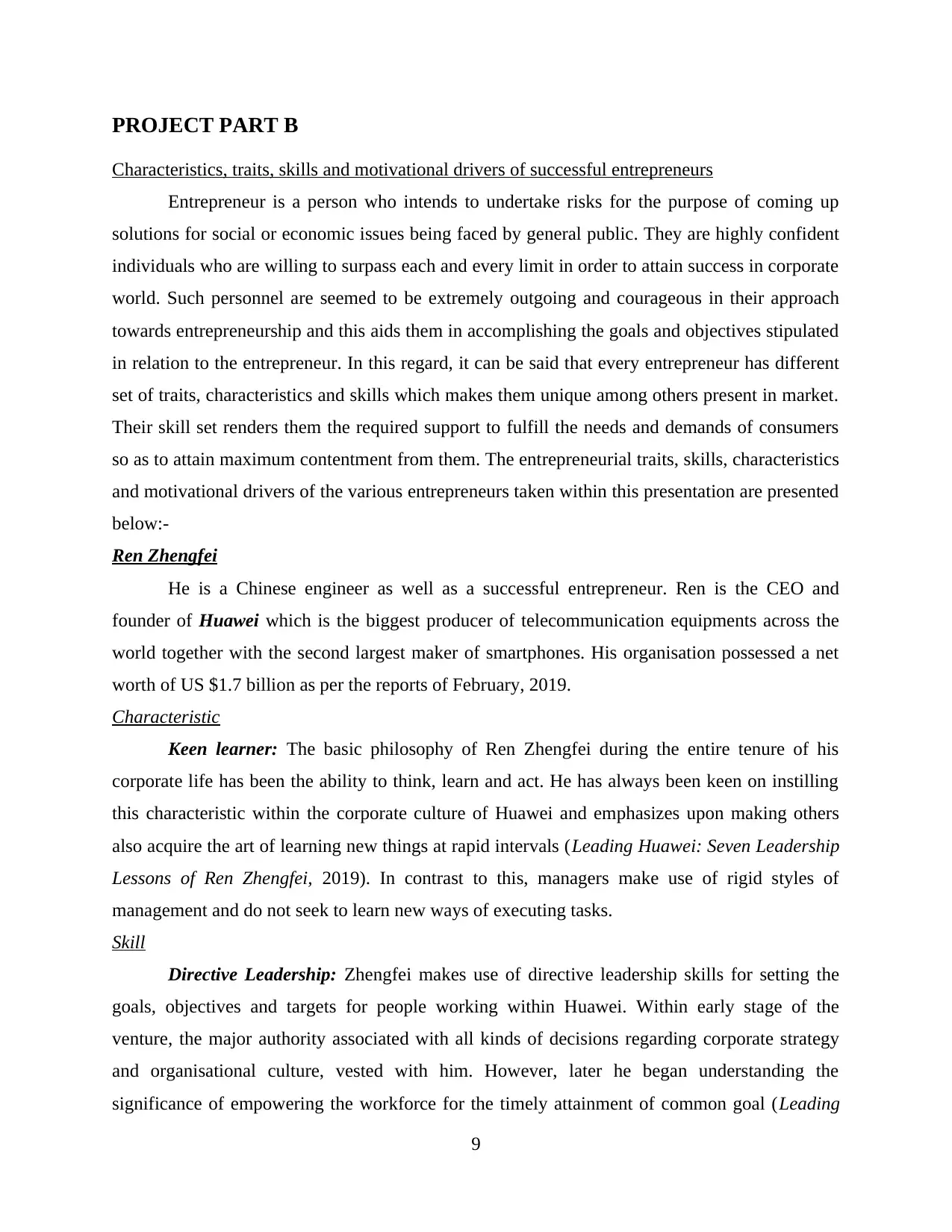
PROJECT PART B
Characteristics, traits, skills and motivational drivers of successful entrepreneurs
Entrepreneur is a person who intends to undertake risks for the purpose of coming up
solutions for social or economic issues being faced by general public. They are highly confident
individuals who are willing to surpass each and every limit in order to attain success in corporate
world. Such personnel are seemed to be extremely outgoing and courageous in their approach
towards entrepreneurship and this aids them in accomplishing the goals and objectives stipulated
in relation to the entrepreneur. In this regard, it can be said that every entrepreneur has different
set of traits, characteristics and skills which makes them unique among others present in market.
Their skill set renders them the required support to fulfill the needs and demands of consumers
so as to attain maximum contentment from them. The entrepreneurial traits, skills, characteristics
and motivational drivers of the various entrepreneurs taken within this presentation are presented
below:-
Ren Zhengfei
He is a Chinese engineer as well as a successful entrepreneur. Ren is the CEO and
founder of Huawei which is the biggest producer of telecommunication equipments across the
world together with the second largest maker of smartphones. His organisation possessed a net
worth of US $1.7 billion as per the reports of February, 2019.
Characteristic
Keen learner: The basic philosophy of Ren Zhengfei during the entire tenure of his
corporate life has been the ability to think, learn and act. He has always been keen on instilling
this characteristic within the corporate culture of Huawei and emphasizes upon making others
also acquire the art of learning new things at rapid intervals (Leading Huawei: Seven Leadership
Lessons of Ren Zhengfei, 2019). In contrast to this, managers make use of rigid styles of
management and do not seek to learn new ways of executing tasks.
Skill
Directive Leadership: Zhengfei makes use of directive leadership skills for setting the
goals, objectives and targets for people working within Huawei. Within early stage of the
venture, the major authority associated with all kinds of decisions regarding corporate strategy
and organisational culture, vested with him. However, later he began understanding the
significance of empowering the workforce for the timely attainment of common goal (Leading
9
Characteristics, traits, skills and motivational drivers of successful entrepreneurs
Entrepreneur is a person who intends to undertake risks for the purpose of coming up
solutions for social or economic issues being faced by general public. They are highly confident
individuals who are willing to surpass each and every limit in order to attain success in corporate
world. Such personnel are seemed to be extremely outgoing and courageous in their approach
towards entrepreneurship and this aids them in accomplishing the goals and objectives stipulated
in relation to the entrepreneur. In this regard, it can be said that every entrepreneur has different
set of traits, characteristics and skills which makes them unique among others present in market.
Their skill set renders them the required support to fulfill the needs and demands of consumers
so as to attain maximum contentment from them. The entrepreneurial traits, skills, characteristics
and motivational drivers of the various entrepreneurs taken within this presentation are presented
below:-
Ren Zhengfei
He is a Chinese engineer as well as a successful entrepreneur. Ren is the CEO and
founder of Huawei which is the biggest producer of telecommunication equipments across the
world together with the second largest maker of smartphones. His organisation possessed a net
worth of US $1.7 billion as per the reports of February, 2019.
Characteristic
Keen learner: The basic philosophy of Ren Zhengfei during the entire tenure of his
corporate life has been the ability to think, learn and act. He has always been keen on instilling
this characteristic within the corporate culture of Huawei and emphasizes upon making others
also acquire the art of learning new things at rapid intervals (Leading Huawei: Seven Leadership
Lessons of Ren Zhengfei, 2019). In contrast to this, managers make use of rigid styles of
management and do not seek to learn new ways of executing tasks.
Skill
Directive Leadership: Zhengfei makes use of directive leadership skills for setting the
goals, objectives and targets for people working within Huawei. Within early stage of the
venture, the major authority associated with all kinds of decisions regarding corporate strategy
and organisational culture, vested with him. However, later he began understanding the
significance of empowering the workforce for the timely attainment of common goal (Leading
9
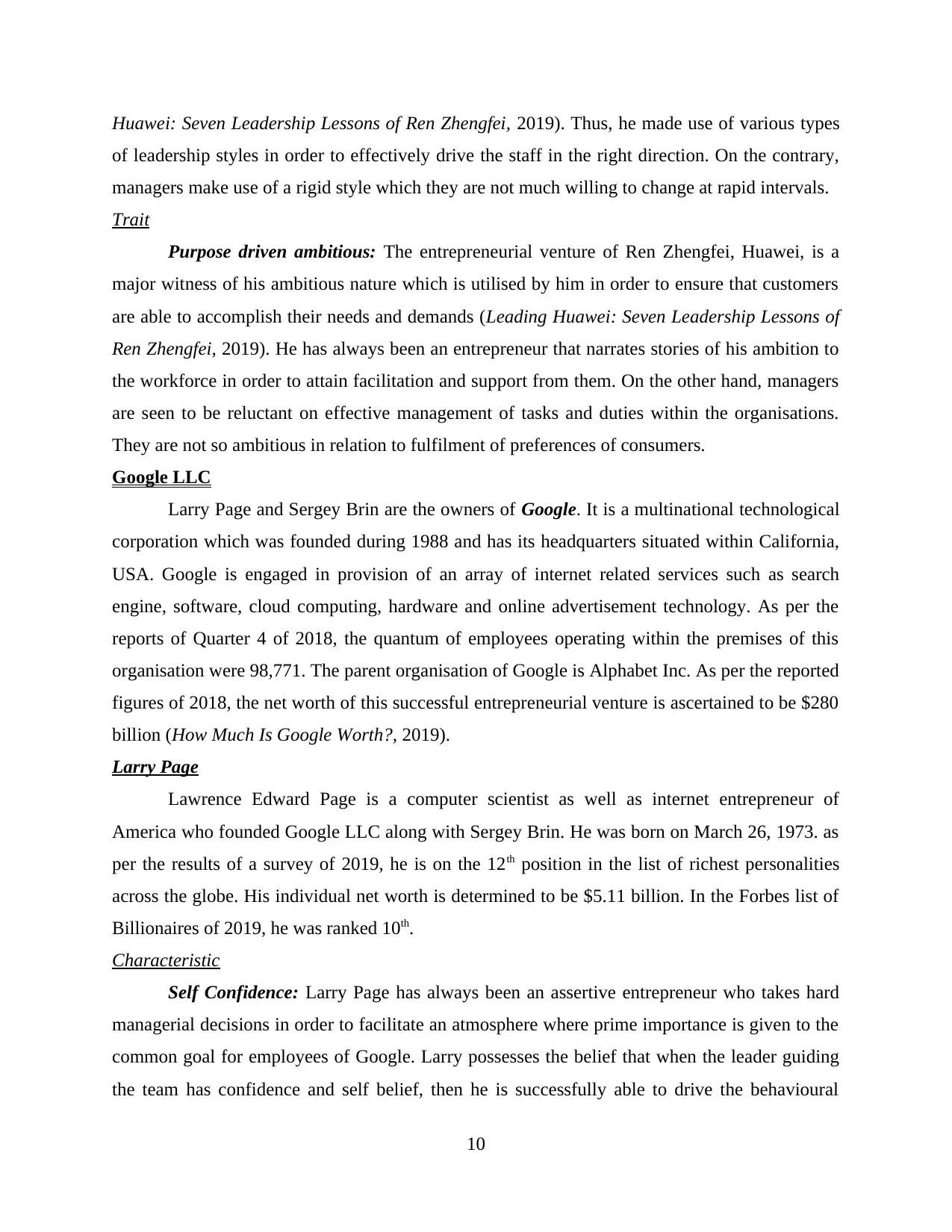
Huawei: Seven Leadership Lessons of Ren Zhengfei, 2019). Thus, he made use of various types
of leadership styles in order to effectively drive the staff in the right direction. On the contrary,
managers make use of a rigid style which they are not much willing to change at rapid intervals.
Trait
Purpose driven ambitious: The entrepreneurial venture of Ren Zhengfei, Huawei, is a
major witness of his ambitious nature which is utilised by him in order to ensure that customers
are able to accomplish their needs and demands (Leading Huawei: Seven Leadership Lessons of
Ren Zhengfei, 2019). He has always been an entrepreneur that narrates stories of his ambition to
the workforce in order to attain facilitation and support from them. On the other hand, managers
are seen to be reluctant on effective management of tasks and duties within the organisations.
They are not so ambitious in relation to fulfilment of preferences of consumers.
Google LLC
Larry Page and Sergey Brin are the owners of Google. It is a multinational technological
corporation which was founded during 1988 and has its headquarters situated within California,
USA. Google is engaged in provision of an array of internet related services such as search
engine, software, cloud computing, hardware and online advertisement technology. As per the
reports of Quarter 4 of 2018, the quantum of employees operating within the premises of this
organisation were 98,771. The parent organisation of Google is Alphabet Inc. As per the reported
figures of 2018, the net worth of this successful entrepreneurial venture is ascertained to be $280
billion (How Much Is Google Worth?, 2019).
Larry Page
Lawrence Edward Page is a computer scientist as well as internet entrepreneur of
America who founded Google LLC along with Sergey Brin. He was born on March 26, 1973. as
per the results of a survey of 2019, he is on the 12th position in the list of richest personalities
across the globe. His individual net worth is determined to be $5.11 billion. In the Forbes list of
Billionaires of 2019, he was ranked 10th.
Characteristic
Self Confidence: Larry Page has always been an assertive entrepreneur who takes hard
managerial decisions in order to facilitate an atmosphere where prime importance is given to the
common goal for employees of Google. Larry possesses the belief that when the leader guiding
the team has confidence and self belief, then he is successfully able to drive the behavioural
10
of leadership styles in order to effectively drive the staff in the right direction. On the contrary,
managers make use of a rigid style which they are not much willing to change at rapid intervals.
Trait
Purpose driven ambitious: The entrepreneurial venture of Ren Zhengfei, Huawei, is a
major witness of his ambitious nature which is utilised by him in order to ensure that customers
are able to accomplish their needs and demands (Leading Huawei: Seven Leadership Lessons of
Ren Zhengfei, 2019). He has always been an entrepreneur that narrates stories of his ambition to
the workforce in order to attain facilitation and support from them. On the other hand, managers
are seen to be reluctant on effective management of tasks and duties within the organisations.
They are not so ambitious in relation to fulfilment of preferences of consumers.
Google LLC
Larry Page and Sergey Brin are the owners of Google. It is a multinational technological
corporation which was founded during 1988 and has its headquarters situated within California,
USA. Google is engaged in provision of an array of internet related services such as search
engine, software, cloud computing, hardware and online advertisement technology. As per the
reports of Quarter 4 of 2018, the quantum of employees operating within the premises of this
organisation were 98,771. The parent organisation of Google is Alphabet Inc. As per the reported
figures of 2018, the net worth of this successful entrepreneurial venture is ascertained to be $280
billion (How Much Is Google Worth?, 2019).
Larry Page
Lawrence Edward Page is a computer scientist as well as internet entrepreneur of
America who founded Google LLC along with Sergey Brin. He was born on March 26, 1973. as
per the results of a survey of 2019, he is on the 12th position in the list of richest personalities
across the globe. His individual net worth is determined to be $5.11 billion. In the Forbes list of
Billionaires of 2019, he was ranked 10th.
Characteristic
Self Confidence: Larry Page has always been an assertive entrepreneur who takes hard
managerial decisions in order to facilitate an atmosphere where prime importance is given to the
common goal for employees of Google. Larry possesses the belief that when the leader guiding
the team has confidence and self belief, then he is successfully able to drive the behavioural
10
Paraphrase This Document
Need a fresh take? Get an instant paraphrase of this document with our AI Paraphraser
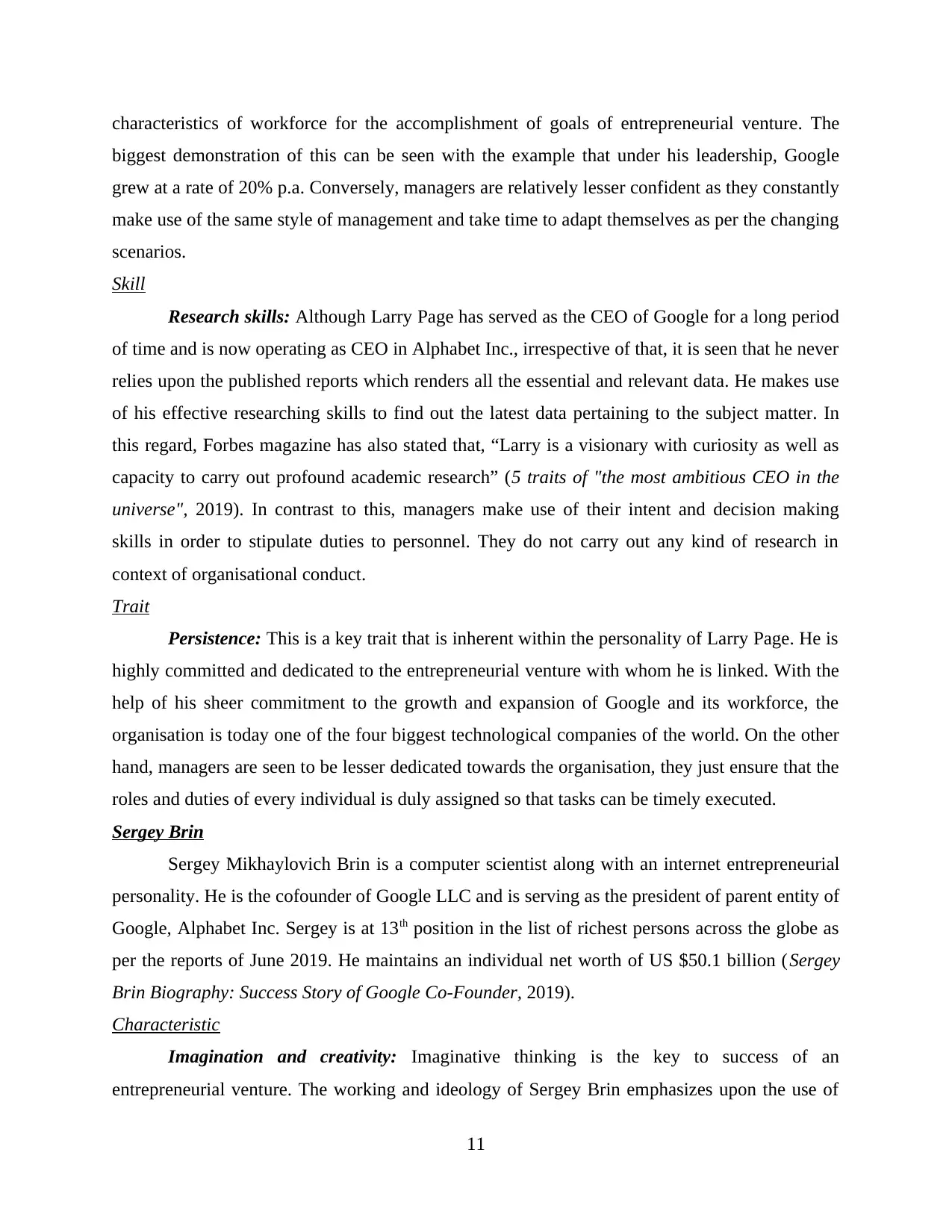
characteristics of workforce for the accomplishment of goals of entrepreneurial venture. The
biggest demonstration of this can be seen with the example that under his leadership, Google
grew at a rate of 20% p.a. Conversely, managers are relatively lesser confident as they constantly
make use of the same style of management and take time to adapt themselves as per the changing
scenarios.
Skill
Research skills: Although Larry Page has served as the CEO of Google for a long period
of time and is now operating as CEO in Alphabet Inc., irrespective of that, it is seen that he never
relies upon the published reports which renders all the essential and relevant data. He makes use
of his effective researching skills to find out the latest data pertaining to the subject matter. In
this regard, Forbes magazine has also stated that, “Larry is a visionary with curiosity as well as
capacity to carry out profound academic research” (5 traits of "the most ambitious CEO in the
universe", 2019). In contrast to this, managers make use of their intent and decision making
skills in order to stipulate duties to personnel. They do not carry out any kind of research in
context of organisational conduct.
Trait
Persistence: This is a key trait that is inherent within the personality of Larry Page. He is
highly committed and dedicated to the entrepreneurial venture with whom he is linked. With the
help of his sheer commitment to the growth and expansion of Google and its workforce, the
organisation is today one of the four biggest technological companies of the world. On the other
hand, managers are seen to be lesser dedicated towards the organisation, they just ensure that the
roles and duties of every individual is duly assigned so that tasks can be timely executed.
Sergey Brin
Sergey Mikhaylovich Brin is a computer scientist along with an internet entrepreneurial
personality. He is the cofounder of Google LLC and is serving as the president of parent entity of
Google, Alphabet Inc. Sergey is at 13th position in the list of richest persons across the globe as
per the reports of June 2019. He maintains an individual net worth of US $50.1 billion (Sergey
Brin Biography: Success Story of Google Co-Founder, 2019).
Characteristic
Imagination and creativity: Imaginative thinking is the key to success of an
entrepreneurial venture. The working and ideology of Sergey Brin emphasizes upon the use of
11
biggest demonstration of this can be seen with the example that under his leadership, Google
grew at a rate of 20% p.a. Conversely, managers are relatively lesser confident as they constantly
make use of the same style of management and take time to adapt themselves as per the changing
scenarios.
Skill
Research skills: Although Larry Page has served as the CEO of Google for a long period
of time and is now operating as CEO in Alphabet Inc., irrespective of that, it is seen that he never
relies upon the published reports which renders all the essential and relevant data. He makes use
of his effective researching skills to find out the latest data pertaining to the subject matter. In
this regard, Forbes magazine has also stated that, “Larry is a visionary with curiosity as well as
capacity to carry out profound academic research” (5 traits of "the most ambitious CEO in the
universe", 2019). In contrast to this, managers make use of their intent and decision making
skills in order to stipulate duties to personnel. They do not carry out any kind of research in
context of organisational conduct.
Trait
Persistence: This is a key trait that is inherent within the personality of Larry Page. He is
highly committed and dedicated to the entrepreneurial venture with whom he is linked. With the
help of his sheer commitment to the growth and expansion of Google and its workforce, the
organisation is today one of the four biggest technological companies of the world. On the other
hand, managers are seen to be lesser dedicated towards the organisation, they just ensure that the
roles and duties of every individual is duly assigned so that tasks can be timely executed.
Sergey Brin
Sergey Mikhaylovich Brin is a computer scientist along with an internet entrepreneurial
personality. He is the cofounder of Google LLC and is serving as the president of parent entity of
Google, Alphabet Inc. Sergey is at 13th position in the list of richest persons across the globe as
per the reports of June 2019. He maintains an individual net worth of US $50.1 billion (Sergey
Brin Biography: Success Story of Google Co-Founder, 2019).
Characteristic
Imagination and creativity: Imaginative thinking is the key to success of an
entrepreneurial venture. The working and ideology of Sergey Brin emphasizes upon the use of
11
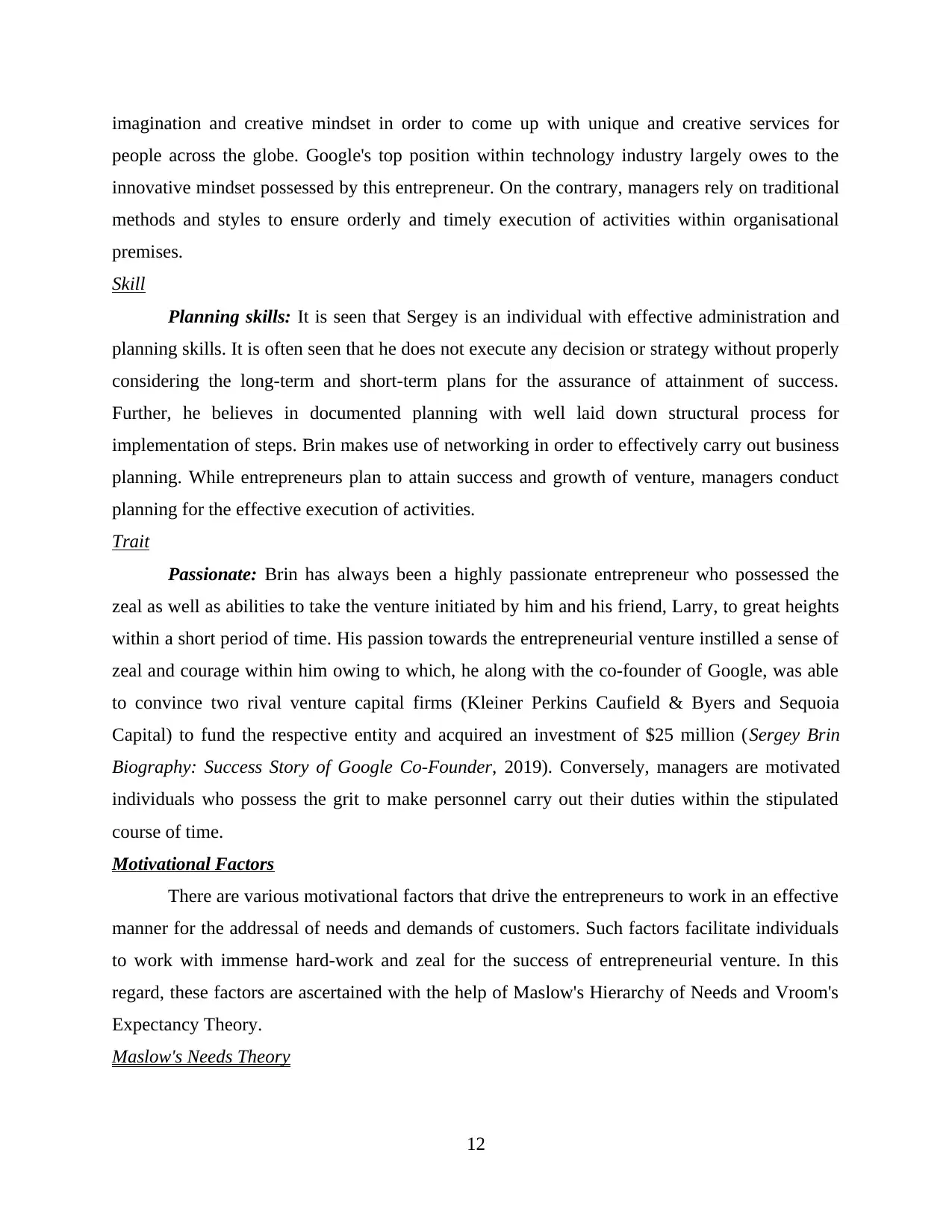
imagination and creative mindset in order to come up with unique and creative services for
people across the globe. Google's top position within technology industry largely owes to the
innovative mindset possessed by this entrepreneur. On the contrary, managers rely on traditional
methods and styles to ensure orderly and timely execution of activities within organisational
premises.
Skill
Planning skills: It is seen that Sergey is an individual with effective administration and
planning skills. It is often seen that he does not execute any decision or strategy without properly
considering the long-term and short-term plans for the assurance of attainment of success.
Further, he believes in documented planning with well laid down structural process for
implementation of steps. Brin makes use of networking in order to effectively carry out business
planning. While entrepreneurs plan to attain success and growth of venture, managers conduct
planning for the effective execution of activities.
Trait
Passionate: Brin has always been a highly passionate entrepreneur who possessed the
zeal as well as abilities to take the venture initiated by him and his friend, Larry, to great heights
within a short period of time. His passion towards the entrepreneurial venture instilled a sense of
zeal and courage within him owing to which, he along with the co-founder of Google, was able
to convince two rival venture capital firms (Kleiner Perkins Caufield & Byers and Sequoia
Capital) to fund the respective entity and acquired an investment of $25 million (Sergey Brin
Biography: Success Story of Google Co-Founder, 2019). Conversely, managers are motivated
individuals who possess the grit to make personnel carry out their duties within the stipulated
course of time.
Motivational Factors
There are various motivational factors that drive the entrepreneurs to work in an effective
manner for the addressal of needs and demands of customers. Such factors facilitate individuals
to work with immense hard-work and zeal for the success of entrepreneurial venture. In this
regard, these factors are ascertained with the help of Maslow's Hierarchy of Needs and Vroom's
Expectancy Theory.
Maslow's Needs Theory
12
people across the globe. Google's top position within technology industry largely owes to the
innovative mindset possessed by this entrepreneur. On the contrary, managers rely on traditional
methods and styles to ensure orderly and timely execution of activities within organisational
premises.
Skill
Planning skills: It is seen that Sergey is an individual with effective administration and
planning skills. It is often seen that he does not execute any decision or strategy without properly
considering the long-term and short-term plans for the assurance of attainment of success.
Further, he believes in documented planning with well laid down structural process for
implementation of steps. Brin makes use of networking in order to effectively carry out business
planning. While entrepreneurs plan to attain success and growth of venture, managers conduct
planning for the effective execution of activities.
Trait
Passionate: Brin has always been a highly passionate entrepreneur who possessed the
zeal as well as abilities to take the venture initiated by him and his friend, Larry, to great heights
within a short period of time. His passion towards the entrepreneurial venture instilled a sense of
zeal and courage within him owing to which, he along with the co-founder of Google, was able
to convince two rival venture capital firms (Kleiner Perkins Caufield & Byers and Sequoia
Capital) to fund the respective entity and acquired an investment of $25 million (Sergey Brin
Biography: Success Story of Google Co-Founder, 2019). Conversely, managers are motivated
individuals who possess the grit to make personnel carry out their duties within the stipulated
course of time.
Motivational Factors
There are various motivational factors that drive the entrepreneurs to work in an effective
manner for the addressal of needs and demands of customers. Such factors facilitate individuals
to work with immense hard-work and zeal for the success of entrepreneurial venture. In this
regard, these factors are ascertained with the help of Maslow's Hierarchy of Needs and Vroom's
Expectancy Theory.
Maslow's Needs Theory
12

This is a motivational theory proposed by Abraham H. Maslow. It gives a detailed
explanation of human behaviour and psychology by arranging the needs of individual in the form
a hierarchical pyramid. Hereby, the needs situated at lower level act as the most important
motivational drivers while the top needs can be satisfied later. The 5 motivational drivers within
this theory are explained below:-
Physiological needs: These are the basic necessities without which a person cannot
survive such as food, clothing etc. These are essential for intrinsic satisfaction and if not
accomplished by a person leads to displeasure among them.
Safety needs: This need is concerned with getting free from all types of dangers and
threats. It includes physical, physiological as well as economical safety in the form of absence of
violence, racism, traumatic stress, disorders etc.
Belongingness needs: This includes feeling of social belongingness in the form of
friendship, acceptance and trust. This basically concerns the development of social networking
among individuals through which motivation can be attained to perform in the desired manner.
Self-esteem needs: It includes the sense of self worth and status needs. People with high
level of self-esteem get motivated to perform in an effective manner so as to attain success in
near future. When they feel that their standard of living is well maintained, they put their
dedication and hard work within all the tasks.
Self–actualisation needs: This is associated with the potential of an individual to attain
highest level of development. This contains the desire of a person to become everything that one
is capable of. When the individual becomes contented with what he has become, he gets
motivated to perform by utilising their full potential.
The above mentioned needs act as motivational drivers for entrepreneurs. In past, these
drivers facilitated Sergey, Larry and Ren to get motivated and work with their sheer dedication
and commitment for the success and growth of their respective entrepreneurial ventures.
Characteristics of entrepreneurial personality reflect entrepreneurial motivation
Every entrepreneur possesses certain unique attributes which differentiates them from
other individuals and facilitate them to attain the goals and objectives of entrepreneurial venture.
OCEAN model of personality has been taken into use in order to illustrate the characteristics of
entrepreneurial personality which leads to their motivation.
13
explanation of human behaviour and psychology by arranging the needs of individual in the form
a hierarchical pyramid. Hereby, the needs situated at lower level act as the most important
motivational drivers while the top needs can be satisfied later. The 5 motivational drivers within
this theory are explained below:-
Physiological needs: These are the basic necessities without which a person cannot
survive such as food, clothing etc. These are essential for intrinsic satisfaction and if not
accomplished by a person leads to displeasure among them.
Safety needs: This need is concerned with getting free from all types of dangers and
threats. It includes physical, physiological as well as economical safety in the form of absence of
violence, racism, traumatic stress, disorders etc.
Belongingness needs: This includes feeling of social belongingness in the form of
friendship, acceptance and trust. This basically concerns the development of social networking
among individuals through which motivation can be attained to perform in the desired manner.
Self-esteem needs: It includes the sense of self worth and status needs. People with high
level of self-esteem get motivated to perform in an effective manner so as to attain success in
near future. When they feel that their standard of living is well maintained, they put their
dedication and hard work within all the tasks.
Self–actualisation needs: This is associated with the potential of an individual to attain
highest level of development. This contains the desire of a person to become everything that one
is capable of. When the individual becomes contented with what he has become, he gets
motivated to perform by utilising their full potential.
The above mentioned needs act as motivational drivers for entrepreneurs. In past, these
drivers facilitated Sergey, Larry and Ren to get motivated and work with their sheer dedication
and commitment for the success and growth of their respective entrepreneurial ventures.
Characteristics of entrepreneurial personality reflect entrepreneurial motivation
Every entrepreneur possesses certain unique attributes which differentiates them from
other individuals and facilitate them to attain the goals and objectives of entrepreneurial venture.
OCEAN model of personality has been taken into use in order to illustrate the characteristics of
entrepreneurial personality which leads to their motivation.
13
Secure Best Marks with AI Grader
Need help grading? Try our AI Grader for instant feedback on your assignments.
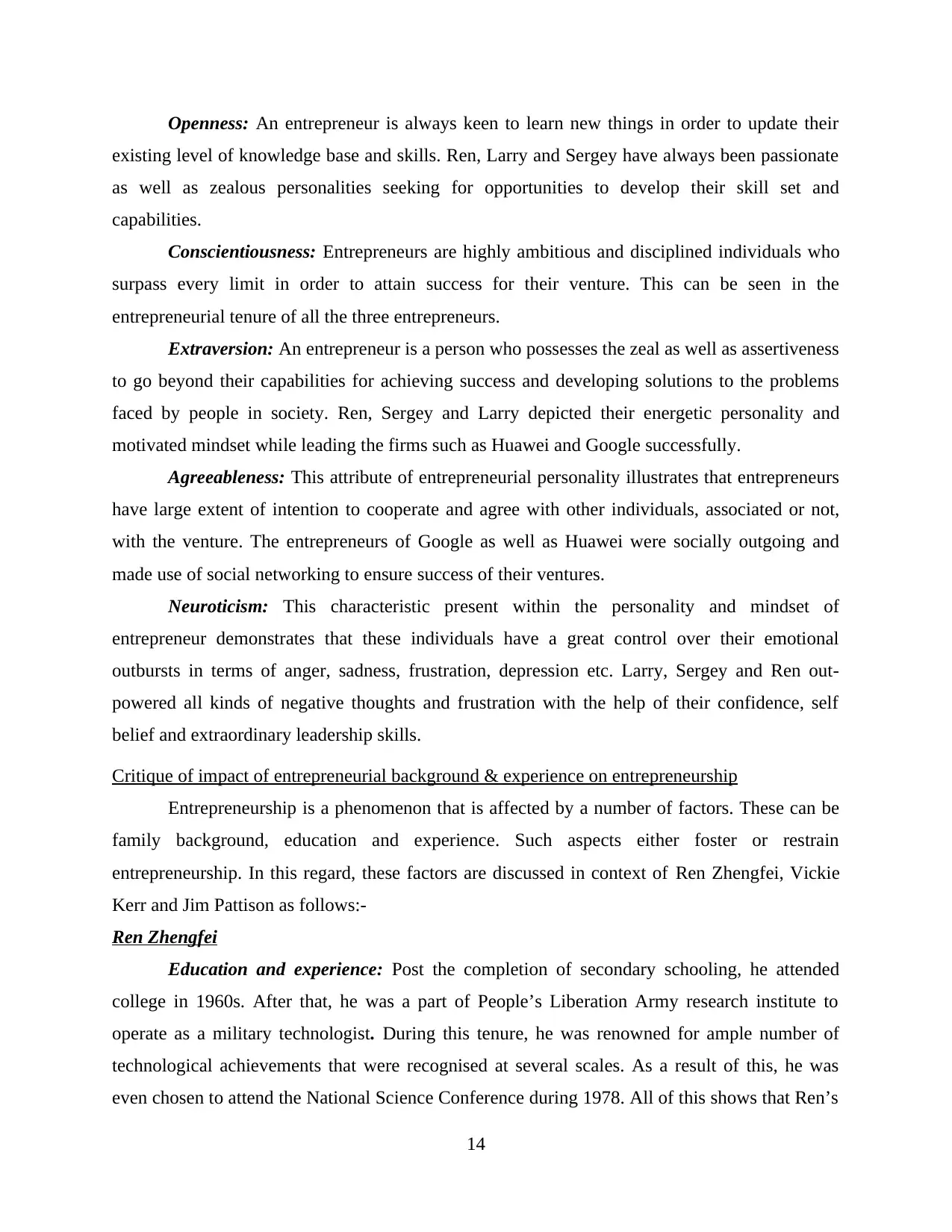
Openness: An entrepreneur is always keen to learn new things in order to update their
existing level of knowledge base and skills. Ren, Larry and Sergey have always been passionate
as well as zealous personalities seeking for opportunities to develop their skill set and
capabilities.
Conscientiousness: Entrepreneurs are highly ambitious and disciplined individuals who
surpass every limit in order to attain success for their venture. This can be seen in the
entrepreneurial tenure of all the three entrepreneurs.
Extraversion: An entrepreneur is a person who possesses the zeal as well as assertiveness
to go beyond their capabilities for achieving success and developing solutions to the problems
faced by people in society. Ren, Sergey and Larry depicted their energetic personality and
motivated mindset while leading the firms such as Huawei and Google successfully.
Agreeableness: This attribute of entrepreneurial personality illustrates that entrepreneurs
have large extent of intention to cooperate and agree with other individuals, associated or not,
with the venture. The entrepreneurs of Google as well as Huawei were socially outgoing and
made use of social networking to ensure success of their ventures.
Neuroticism: This characteristic present within the personality and mindset of
entrepreneur demonstrates that these individuals have a great control over their emotional
outbursts in terms of anger, sadness, frustration, depression etc. Larry, Sergey and Ren out-
powered all kinds of negative thoughts and frustration with the help of their confidence, self
belief and extraordinary leadership skills.
Critique of impact of entrepreneurial background & experience on entrepreneurship
Entrepreneurship is a phenomenon that is affected by a number of factors. These can be
family background, education and experience. Such aspects either foster or restrain
entrepreneurship. In this regard, these factors are discussed in context of Ren Zhengfei, Vickie
Kerr and Jim Pattison as follows:-
Ren Zhengfei
Education and experience: Post the completion of secondary schooling, he attended
college in 1960s. After that, he was a part of People’s Liberation Army research institute to
operate as a military technologist. During this tenure, he was renowned for ample number of
technological achievements that were recognised at several scales. As a result of this, he was
even chosen to attend the National Science Conference during 1978. All of this shows that Ren’s
14
existing level of knowledge base and skills. Ren, Larry and Sergey have always been passionate
as well as zealous personalities seeking for opportunities to develop their skill set and
capabilities.
Conscientiousness: Entrepreneurs are highly ambitious and disciplined individuals who
surpass every limit in order to attain success for their venture. This can be seen in the
entrepreneurial tenure of all the three entrepreneurs.
Extraversion: An entrepreneur is a person who possesses the zeal as well as assertiveness
to go beyond their capabilities for achieving success and developing solutions to the problems
faced by people in society. Ren, Sergey and Larry depicted their energetic personality and
motivated mindset while leading the firms such as Huawei and Google successfully.
Agreeableness: This attribute of entrepreneurial personality illustrates that entrepreneurs
have large extent of intention to cooperate and agree with other individuals, associated or not,
with the venture. The entrepreneurs of Google as well as Huawei were socially outgoing and
made use of social networking to ensure success of their ventures.
Neuroticism: This characteristic present within the personality and mindset of
entrepreneur demonstrates that these individuals have a great control over their emotional
outbursts in terms of anger, sadness, frustration, depression etc. Larry, Sergey and Ren out-
powered all kinds of negative thoughts and frustration with the help of their confidence, self
belief and extraordinary leadership skills.
Critique of impact of entrepreneurial background & experience on entrepreneurship
Entrepreneurship is a phenomenon that is affected by a number of factors. These can be
family background, education and experience. Such aspects either foster or restrain
entrepreneurship. In this regard, these factors are discussed in context of Ren Zhengfei, Vickie
Kerr and Jim Pattison as follows:-
Ren Zhengfei
Education and experience: Post the completion of secondary schooling, he attended
college in 1960s. After that, he was a part of People’s Liberation Army research institute to
operate as a military technologist. During this tenure, he was renowned for ample number of
technological achievements that were recognised at several scales. As a result of this, he was
even chosen to attend the National Science Conference during 1978. All of this shows that Ren’s
14
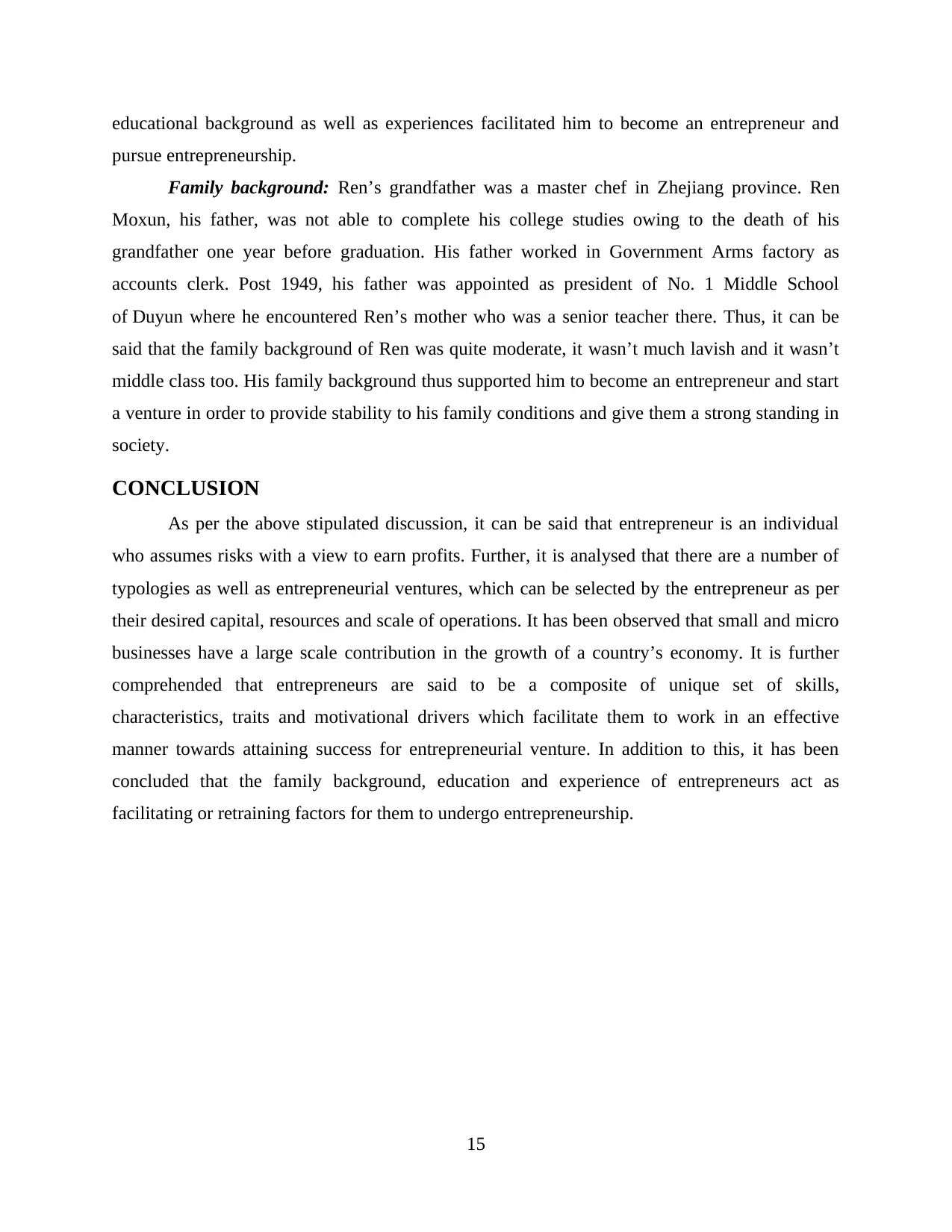
educational background as well as experiences facilitated him to become an entrepreneur and
pursue entrepreneurship.
Family background: Ren’s grandfather was a master chef in Zhejiang province. Ren
Moxun, his father, was not able to complete his college studies owing to the death of his
grandfather one year before graduation. His father worked in Government Arms factory as
accounts clerk. Post 1949, his father was appointed as president of No. 1 Middle School
of Duyun where he encountered Ren’s mother who was a senior teacher there. Thus, it can be
said that the family background of Ren was quite moderate, it wasn’t much lavish and it wasn’t
middle class too. His family background thus supported him to become an entrepreneur and start
a venture in order to provide stability to his family conditions and give them a strong standing in
society.
CONCLUSION
As per the above stipulated discussion, it can be said that entrepreneur is an individual
who assumes risks with a view to earn profits. Further, it is analysed that there are a number of
typologies as well as entrepreneurial ventures, which can be selected by the entrepreneur as per
their desired capital, resources and scale of operations. It has been observed that small and micro
businesses have a large scale contribution in the growth of a country’s economy. It is further
comprehended that entrepreneurs are said to be a composite of unique set of skills,
characteristics, traits and motivational drivers which facilitate them to work in an effective
manner towards attaining success for entrepreneurial venture. In addition to this, it has been
concluded that the family background, education and experience of entrepreneurs act as
facilitating or retraining factors for them to undergo entrepreneurship.
15
pursue entrepreneurship.
Family background: Ren’s grandfather was a master chef in Zhejiang province. Ren
Moxun, his father, was not able to complete his college studies owing to the death of his
grandfather one year before graduation. His father worked in Government Arms factory as
accounts clerk. Post 1949, his father was appointed as president of No. 1 Middle School
of Duyun where he encountered Ren’s mother who was a senior teacher there. Thus, it can be
said that the family background of Ren was quite moderate, it wasn’t much lavish and it wasn’t
middle class too. His family background thus supported him to become an entrepreneur and start
a venture in order to provide stability to his family conditions and give them a strong standing in
society.
CONCLUSION
As per the above stipulated discussion, it can be said that entrepreneur is an individual
who assumes risks with a view to earn profits. Further, it is analysed that there are a number of
typologies as well as entrepreneurial ventures, which can be selected by the entrepreneur as per
their desired capital, resources and scale of operations. It has been observed that small and micro
businesses have a large scale contribution in the growth of a country’s economy. It is further
comprehended that entrepreneurs are said to be a composite of unique set of skills,
characteristics, traits and motivational drivers which facilitate them to work in an effective
manner towards attaining success for entrepreneurial venture. In addition to this, it has been
concluded that the family background, education and experience of entrepreneurs act as
facilitating or retraining factors for them to undergo entrepreneurship.
15
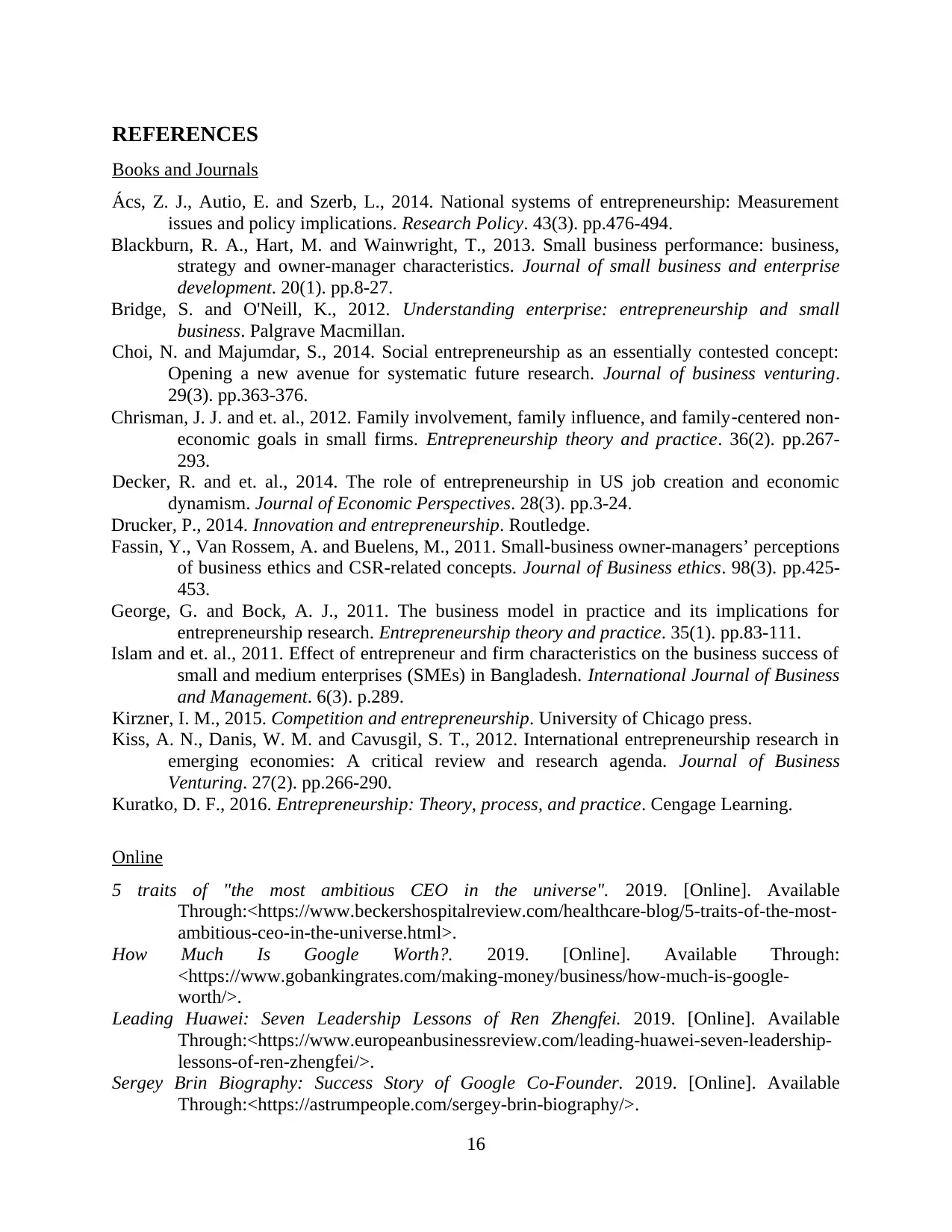
REFERENCES
Books and Journals
Ács, Z. J., Autio, E. and Szerb, L., 2014. National systems of entrepreneurship: Measurement
issues and policy implications. Research Policy. 43(3). pp.476-494.
Blackburn, R. A., Hart, M. and Wainwright, T., 2013. Small business performance: business,
strategy and owner-manager characteristics. Journal of small business and enterprise
development. 20(1). pp.8-27.
Bridge, S. and O'Neill, K., 2012. Understanding enterprise: entrepreneurship and small
business. Palgrave Macmillan.
Choi, N. and Majumdar, S., 2014. Social entrepreneurship as an essentially contested concept:
Opening a new avenue for systematic future research. Journal of business venturing.
29(3). pp.363-376.
Chrisman, J. J. and et. al., 2012. Family involvement, family influence, and family‐centered non‐
economic goals in small firms. Entrepreneurship theory and practice. 36(2). pp.267-
293.
Decker, R. and et. al., 2014. The role of entrepreneurship in US job creation and economic
dynamism. Journal of Economic Perspectives. 28(3). pp.3-24.
Drucker, P., 2014. Innovation and entrepreneurship. Routledge.
Fassin, Y., Van Rossem, A. and Buelens, M., 2011. Small-business owner-managers’ perceptions
of business ethics and CSR-related concepts. Journal of Business ethics. 98(3). pp.425-
453.
George, G. and Bock, A. J., 2011. The business model in practice and its implications for
entrepreneurship research. Entrepreneurship theory and practice. 35(1). pp.83-111.
Islam and et. al., 2011. Effect of entrepreneur and firm characteristics on the business success of
small and medium enterprises (SMEs) in Bangladesh. International Journal of Business
and Management. 6(3). p.289.
Kirzner, I. M., 2015. Competition and entrepreneurship. University of Chicago press.
Kiss, A. N., Danis, W. M. and Cavusgil, S. T., 2012. International entrepreneurship research in
emerging economies: A critical review and research agenda. Journal of Business
Venturing. 27(2). pp.266-290.
Kuratko, D. F., 2016. Entrepreneurship: Theory, process, and practice. Cengage Learning.
Online
5 traits of "the most ambitious CEO in the universe". 2019. [Online]. Available
Through:<https://www.beckershospitalreview.com/healthcare-blog/5-traits-of-the-most-
ambitious-ceo-in-the-universe.html>.
How Much Is Google Worth?. 2019. [Online]. Available Through:
<https://www.gobankingrates.com/making-money/business/how-much-is-google-
worth/>.
Leading Huawei: Seven Leadership Lessons of Ren Zhengfei. 2019. [Online]. Available
Through:<https://www.europeanbusinessreview.com/leading-huawei-seven-leadership-
lessons-of-ren-zhengfei/>.
Sergey Brin Biography: Success Story of Google Co-Founder. 2019. [Online]. Available
Through:<https://astrumpeople.com/sergey-brin-biography/>.
16
Books and Journals
Ács, Z. J., Autio, E. and Szerb, L., 2014. National systems of entrepreneurship: Measurement
issues and policy implications. Research Policy. 43(3). pp.476-494.
Blackburn, R. A., Hart, M. and Wainwright, T., 2013. Small business performance: business,
strategy and owner-manager characteristics. Journal of small business and enterprise
development. 20(1). pp.8-27.
Bridge, S. and O'Neill, K., 2012. Understanding enterprise: entrepreneurship and small
business. Palgrave Macmillan.
Choi, N. and Majumdar, S., 2014. Social entrepreneurship as an essentially contested concept:
Opening a new avenue for systematic future research. Journal of business venturing.
29(3). pp.363-376.
Chrisman, J. J. and et. al., 2012. Family involvement, family influence, and family‐centered non‐
economic goals in small firms. Entrepreneurship theory and practice. 36(2). pp.267-
293.
Decker, R. and et. al., 2014. The role of entrepreneurship in US job creation and economic
dynamism. Journal of Economic Perspectives. 28(3). pp.3-24.
Drucker, P., 2014. Innovation and entrepreneurship. Routledge.
Fassin, Y., Van Rossem, A. and Buelens, M., 2011. Small-business owner-managers’ perceptions
of business ethics and CSR-related concepts. Journal of Business ethics. 98(3). pp.425-
453.
George, G. and Bock, A. J., 2011. The business model in practice and its implications for
entrepreneurship research. Entrepreneurship theory and practice. 35(1). pp.83-111.
Islam and et. al., 2011. Effect of entrepreneur and firm characteristics on the business success of
small and medium enterprises (SMEs) in Bangladesh. International Journal of Business
and Management. 6(3). p.289.
Kirzner, I. M., 2015. Competition and entrepreneurship. University of Chicago press.
Kiss, A. N., Danis, W. M. and Cavusgil, S. T., 2012. International entrepreneurship research in
emerging economies: A critical review and research agenda. Journal of Business
Venturing. 27(2). pp.266-290.
Kuratko, D. F., 2016. Entrepreneurship: Theory, process, and practice. Cengage Learning.
Online
5 traits of "the most ambitious CEO in the universe". 2019. [Online]. Available
Through:<https://www.beckershospitalreview.com/healthcare-blog/5-traits-of-the-most-
ambitious-ceo-in-the-universe.html>.
How Much Is Google Worth?. 2019. [Online]. Available Through:
<https://www.gobankingrates.com/making-money/business/how-much-is-google-
worth/>.
Leading Huawei: Seven Leadership Lessons of Ren Zhengfei. 2019. [Online]. Available
Through:<https://www.europeanbusinessreview.com/leading-huawei-seven-leadership-
lessons-of-ren-zhengfei/>.
Sergey Brin Biography: Success Story of Google Co-Founder. 2019. [Online]. Available
Through:<https://astrumpeople.com/sergey-brin-biography/>.
16
Paraphrase This Document
Need a fresh take? Get an instant paraphrase of this document with our AI Paraphraser

Small business sector contribution to the Australian economy. 2019. [Online]. Available
Through:<https://www.aph.gov.au/About_Parliament/Parliamentary_Departments/
Parliamentary_Library/pubs/rp/rp1819/SmallBusinessSector>.
17
Through:<https://www.aph.gov.au/About_Parliament/Parliamentary_Departments/
Parliamentary_Library/pubs/rp/rp1819/SmallBusinessSector>.
17
1 out of 20
Related Documents
Your All-in-One AI-Powered Toolkit for Academic Success.
+13062052269
info@desklib.com
Available 24*7 on WhatsApp / Email
![[object Object]](/_next/static/media/star-bottom.7253800d.svg)
Unlock your academic potential
© 2024 | Zucol Services PVT LTD | All rights reserved.





